#U.S. Sports History
Text
#AllAmericanExhibit Trophy Showcase
The #AllAmericanExhibit at the National Archives, titled "All American: The Power of Sports," is a tribute to the role of sports in American society, highlighting how sports have the power to unite people, teach values, and challenge social barriers.
This exhibit, running through January 7, 2024, showcases over 75 items including original records, artifacts, and photographs across four thematic sections: The Power to Unite, Teach, Break Barriers, and Promote. Among the featured items, visitors can view historic sports trophies like Althea Gibson's 1958 Wimbledon trophy and the 1929 West Point Cavalry (Buffalo Soldiers) Football Championship Trophy, along with many others.
Check out some of our collection:
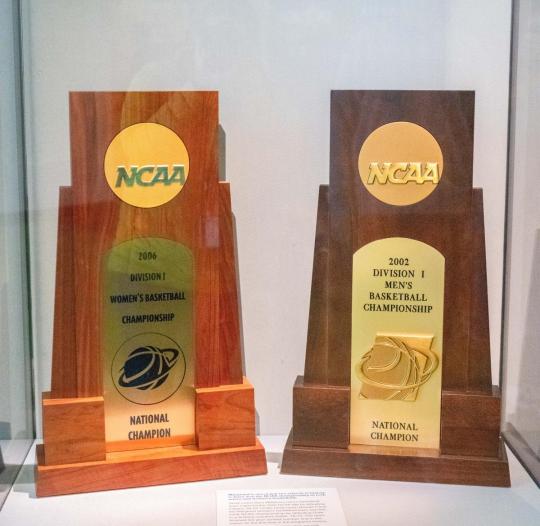
NCAA Basketball Championship trophies, 2002 and 2006, on display at the National Archives Museum in Washington, DC. Photo by Susana Raab.
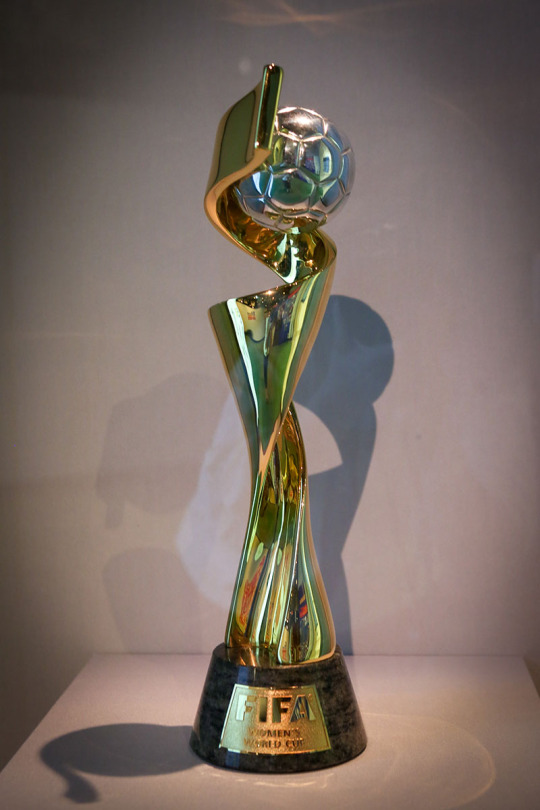
FIFA Women's World Cup Trophy, 2019, on display at the National Archives Museum in Washington, DC. Photo by Susana Raab.
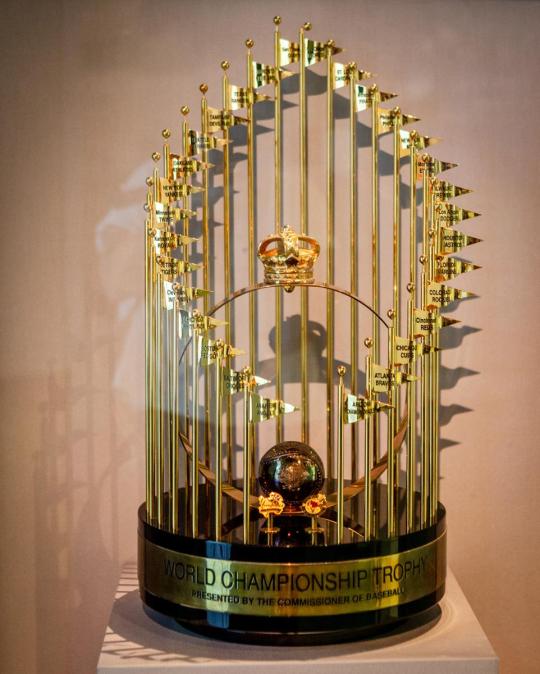
The Commissioner’s Trophy
The 1998 World Series trophy is now on display as part of the exhibit All American: The Power of Sports at the National Archives Museum in Washington, DC. The New York Yankees defeated the San Diego Padres in four straight games in that year’s Fall Classic. The trophy, currently on loan from the National Baseball Hall of Fame, will be on display through November 14. The FIFA Women’s World Cup trophy, two NCAA Basketball Championship trophies, and the Lombardi Trophy from Super Bowl LIV have previously been featured in the exhibit. All American will be on view through January 7, 2024, in the Lawrence F. O’Brien Gallery of the National Archives Museum. Admission to the National Archives Museum is always free, and reservations are not required. National Archives photo by Susana Raab.
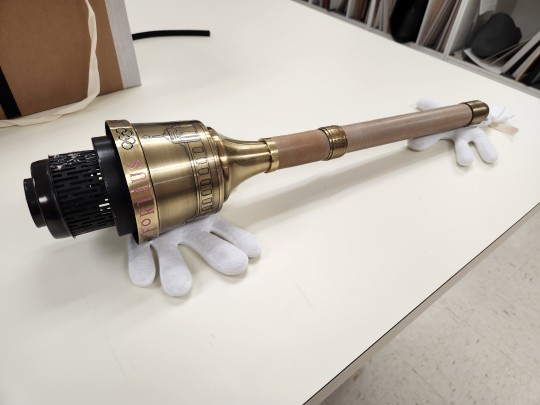
1984 Los Angeles Olympics Torch
At the White House on May 14, 1984, Kurt Thomas, a former Olympic gymnast, passed the flame from his torch to that held by Charlotte Pearson, a member of the Special Olympics team. The ceremony was part of the 9,000-mile Olympic torch relay through 33 states and the District of Columbia. President Ronald Reagan momentarily held one of the torches while the athletes adjusted the flame of the other. The Los Angeles Olympic Organizing Committee gave this torch to President Reagan after the ceremony.
Read more:
22 notes
·
View notes
Text
did you know that green socks are a symbol often associated with queer men?

i follow Eleanor Medhurst, a lesbian fashion historian, on tiktok. she made this video researching green’s role in queer color history and stumbled upon the presence of green socks as a symbol for queer men in the U.S. in the 1960s.
the tradition dates back to before Celtic tribes inhabited the British Isles when “the British Isles were inhabited by a darker-skinned pagan tribal culture known as the Brownies or, alternately, the Fairies.” Their culture emphasized non-patriarchal values and sexual liberation, which most likely included same-sex relationships. If you’ve ever heard of queer men being referred to as fairies, this is why.
Green was a color often sported by these people. Alongside this, Thursday was a holy day, hence the old superstition/saying that wearing green on Thursdays means you’re queer.
Phillip Hiscock, an assistant archivist and cited source in Medhurst’s video, stated, “To wear green socks, by the same people*, was thought to be a sure token of queerness, of being homosexual.”
*people who took care to wear green on Thursdays
Source: Venetia Newall, ‘Folklore and Male Homosexuality’
I think it’s definitely interesting that the writers chose to emphasize Mike’s choice of green socks in this episode!
#mike wheeler is gayyyyyyy#mike wheeler#byler#byler analysis#mike wheeler is gay#mike wheeler analysis#stranger things analysis
434 notes
·
View notes
Photo
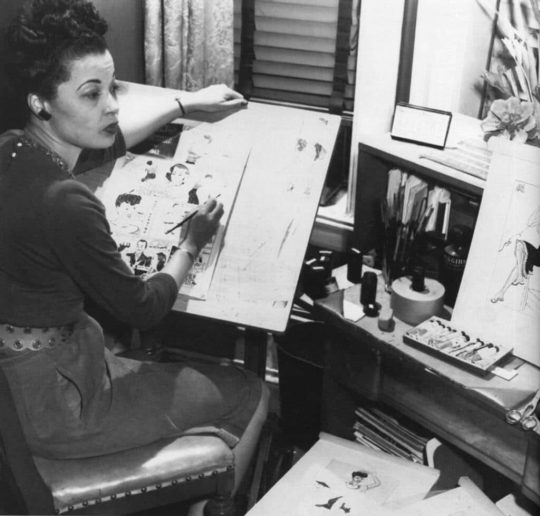

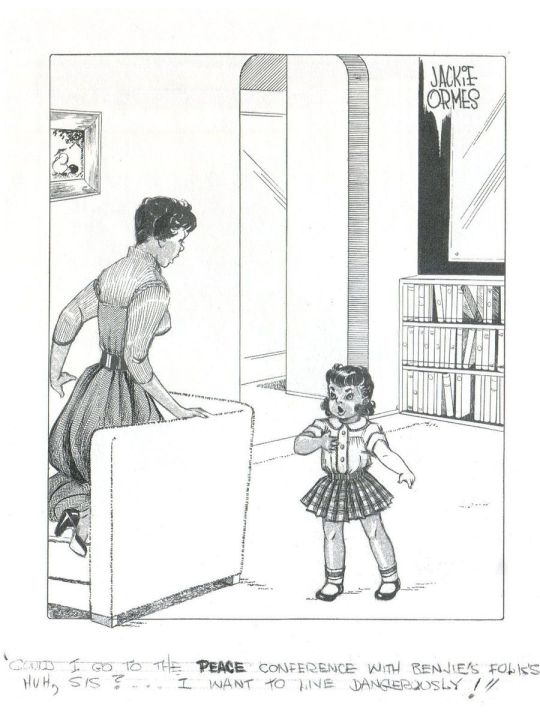
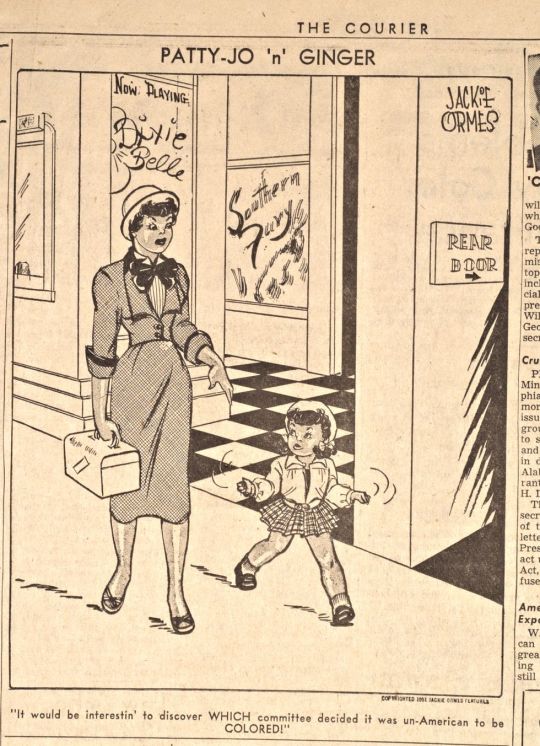

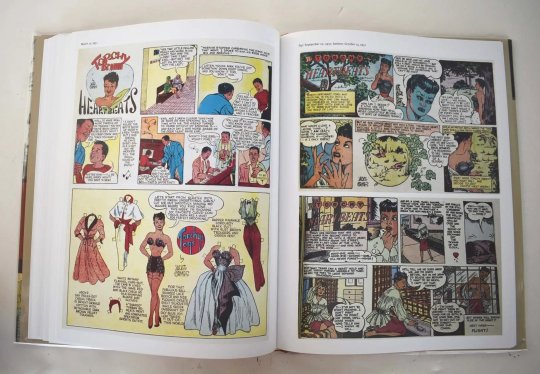
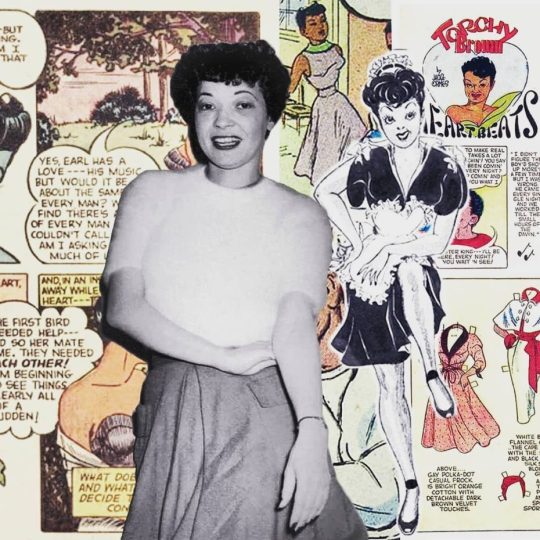
Jackie Ormes, the first Black American woman cartoonist
When the 14-year-old Black American boy Emmett Till was lynched in 1955, one cartoonist responded in a single-panel comic. It showed one Black girl telling another: "I don't want to seem touchy on the subject... but that new little white tea-kettle just whistled at me!"
It may not seem radical today, but penning such a political cartoon was a bold and brave statement for its time — especially for the artist who was behind it. This cartoon was drawn by Jackie Ormes, the first syndicated Black American woman cartoonist to be published in a newspaper. Ormes, who grew up in Pittsburgh, got her first break as cartoonist as a teenager. She started working for the Pittsburgh Courier as a sports reporter, then editor, then cartoonist who penned her first comic, Torchy Brown in Dixie to Harlem, in 1937. It followed a Mississippi teen who becomes a famous singer at the famed Harlem jazz club, The Cotton Club.
In 1942, Ormes moved to Chicago, where she drew her most popular cartoon, Patty-Jo 'n' Ginger, which followed two sisters who made sharp political commentary on Black American life.
In 1947, Ormes created the Patty-Jo doll, the first Black doll that wasn't a mammy doll or a Topsy-Turvy doll. In production for a decade, it was a role model for young black girls. "The doll was a fashionable, beautiful character," says Daniel Schulman, who curated one of the dolls into a recent Chicago exhibition. "It had an extraordinary presence and power — they're collected today and have important place in American doll-making in the U.S."
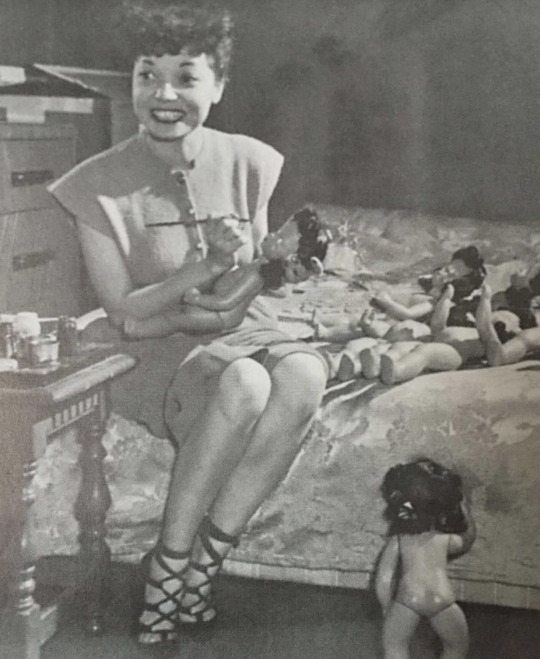
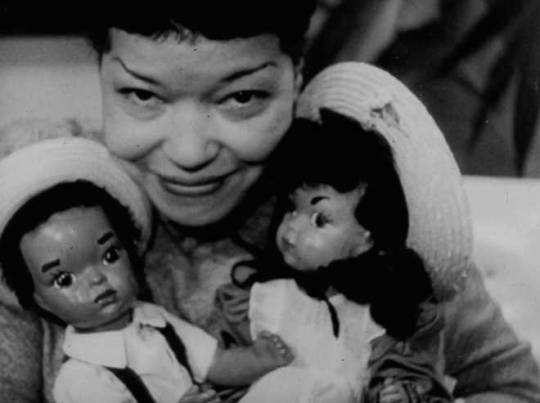
In 1950, Ormes drew her final strip, Torchy in Heartbeats, which followed an independent, stylish black woman on the quest for love — who commented on racism in the South. "Torchy was adventurous, we never saw that with an Black American female figure," says Beauchamp-Byrd. "And remember, this is the 1950s." Ormes was the first to portray black women as intellectual and socially-aware in a time when they were depicted in a derogatory way.
One common mistake that erased Ormes from history is mis-crediting Barbara Brandon-Croft as the first nationally syndicated Black American female cartoonist. "I'm just the first mainstream cartoonist, I'm not the first at all," says Brandon-Croft, who published her cartoons in the Detroit Free Press in the 1990s. "So much of Black history has been ignored, it's a reminder that Black history shouldn't just be celebrated in February."
Source
#jackie ormes#black american history#black history#black cartoonist#black comics#comics#barbara brandon croft#barbara brandon#black artists
3K notes
·
View notes
Text


Thinking about Alyssa Naeher’s 2024:
- 100th cap in the Gold Cup quarterfinal, two incredible saves, clean sheet, WOTM
- Three saves and scores a goal in the Gold Cup semis shootout
- More saves and scores AGAIN in the SheBelieves final shootout
- Outrageous kick save in an Olympic semifinal against Germany
- One of the greatest saves ever in the Gold Medal Match
- 0 goals allowed in three knockout stage matches
One of the greatest goalkeepers in the history of the sport, one of the most important athletes in U.S. history, not just for soccer ❤️���
105 notes
·
View notes
Text

Today In History
On October 16, 1968, African American Olympic sprinters Tommie Smith and John Carlos, who engaged in a silent protest on the medal stand to bring light to the racial discrimination and violence against African Americans in the U.S., were met with hostility by white supporters and the media, and were eventually suspended for their protest.
The 1968 Olympics followed a summer of racial unrest and protest following the assassination of Dr. Martin Luther King Jr. in April.
Mr. Smith and Mr. Carlos placed first and third in the 200-meter dash at the Olympic Games in Mexico City. As the U.S. national anthem played during the medal ceremony, the two men bowed their heads and raised black gloved fists in a protest against racial discrimination in the U.S. Both men wore black socks with no shoes, and Mr. Smith also wore a black scarf around his neck. Mr. Smith raised his right fist to represent Black power, while Mr. Carlos raised his left fist to represent Black unity. Also, in support was the silver medalist Peter Norman from Australia who wore a badge that read: “Olympic Project for Human Rights” – an organization set up a year previously who oppose racism in sport.
The following day, the U.S. Olympic Committee threatened other athletes with stern disciplinary action if they engaged in demonstrations. Acting USOC Director Everett Barnes issued a formal statement to the Olympic International Committee, condemning Mr. Smith and Mr. Carlos, and claiming that the sprinters “made our country look like the devil.”
The USOC suspended Mr. Smith and Mr. Carlos from the U.S. Olympic team following a midnight meeting. In the early hours of the morning on October 18, the Committee ordered both men to vacate the Olympic village in Mexico within 48 hours.
Despite their medal-winning performances, the two athletes faced intense criticism in the media and received death threats upon returning home.
CARTER™️ Magazine
#carter magazine#carter#historyandhiphop365#wherehistoryandhiphopmeet#history#cartermagazine#today in history#staywoke#blackhistory#blackhistorymonth
210 notes
·
View notes
Text

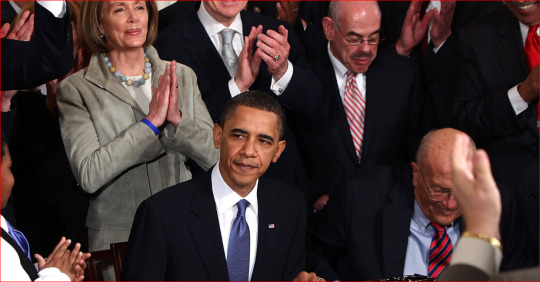
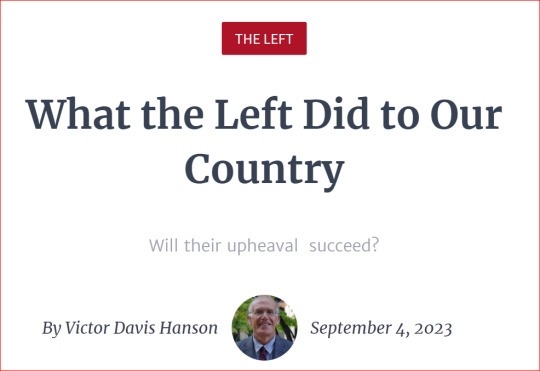
In the last 20 years, the Left has boasted that it has gained control of most of America institutions of power and influence—the corporate boardroom, media, Silicon Valley, Wall Street, the administrative state, academia, foundations, social media, entertainment, professional sports, and Hollywood.
With such support, between 2009-17, Barack Obama was empowered to transform the Democratic Party from its middle-class roots and class concerns into the party of the bicoastal rich and subsidized poor—obsessions with big money, race, a new intolerant green religion, and dividing the country into a binary of oppressors and oppressed.
The Obamas entered the presidency spouting the usual leftwing boilerplate (“spread the wealth,” “just downright mean country,” “get in their face,” “first time I’ve been proud of my country”) as upper-middle-class, former community activists, hurt that their genius and talents had not yet been sufficiently monetized.
After getting elected through temporarily pivoting to racial ecumenicalism and pseudo-calls for unity, they reverted to form and governed by dividing the country. And then the two left the White House as soon-to-be mansion living, mega-rich elites, cashing in on the fears they had inculcated over the prior eight years.
To push through the accompanying unpopular agendas of an open border, mandatory wind and solar energy, racial essentialism, and the weaponization of the state, Obama had begun demonizing his opponents and the country in general: America was an unexceptional place. Cops were racist. “Clingers” of the Midwest were hopelessly ignorant and prejudiced. Only fundamental socialist transformation could salvage a historically oppressive, immoral, and racist nation.
The people finally rebelled at such preposterousness. Obama lost his party some 1,400 local and state offices during his tenure, along with both houses of Congress. His presidency was characterized by his own polarizing mediocrity. His one legacy was Obamacare, the veritable destruction of the entire system of a once workable health insurance, of the hallowed doctor-patient relationship, and of former easy access to competent specialists.
Yet Obama’s unfufilled ambitions set the stage for the Biden administration—staffed heavily with Obama veterans—to complete the revolutionary transformation of the Democratic Party and country.
It was ironic that while Obama was acknowledged as young and charismatic, nonetheless a cognitively challenged, past plagiarist, fabulist, and utterly corrupt Joe Biden was far more effective in ramming through a socialist woke agenda and altering the very way Americans vote and conduct their legal system.
Stranger still, Biden accomplished this subversion of traditional America while debilitated and often mentally inert—along with being mired in a bribery and influence-peddling scandal that may ultimately confirm that he easily was the most corrupt president to hold office in U.S. history.
How was all this possible?
Covid had allowed the unwell Biden to run a surrogate campaign from his basement as he outsourced his politicking to a corrupt media.
Senility proved a godsend for Biden. His cognitive disabilities masked his newfound radicalism and long-accustomed incompetence. Unlike his past failed campaigns, the lockdowns allowed Biden to be rarely seen or heard—and thus as much liked in the abstract as he had previously been disliked in the concrete.
His handlers, the Obamas, and the Bernie Sanders and Elizabeth Warren radical Democrats, saw Biden’s half-century pretense as a gladhander—good ole Joe Biden from Scranton—as the perfect delivery system to funnel their own otherwise-unpopular leftwing agendas. In sum, via the listless Biden, they sought to change the very way America used to work.
And what a revolution Biden’s puppeteers have unleashed in less than three years.
They launched a base attack on the American legal system. Supreme Court judges are libeled, their houses swarmed, and their lives threatened with impunity. The Left promised to pack the court or to ignore any decision it resents. The media runs hit pieces on any conservative justice deemed too influential. The prior Senate Minority Leader Chuck Schumer whipped up a mob outside the court’s doors, and threatened two justices by name. As Schumer presciently put it, they would soon “reap the whirlwind” of what they supposedly had sowed and thus would have no idea what was about to “hit” them.
Under the pretense of Covid fears, balloting went from 70 percent participation on election day in most states to a mere 30 percent. Yet the rates of properly rejected illegal or improper ballots often dived by a magnitude of ten.
Assaults now followed on hallowed processes, laws, customs, and institutions—the Senate filibuster, the 50-state union, the Electoral College, the nine-justice Supreme Court, Election Day, and voter IDs.
Under Biden, the revolution had institutionalized first-term impeachment, the trial of an ex-president while a private citizen, and the indictment of a chief political rival and ex-president on trumped up charges by local and federal prosecutors—all to destroy a political rival and alter the 2024 election cycle.
Biden destroyed the southern border—literally. Eight million entered illegally—no background checks, no green cards, no proof of vaccinations. America will be dealing with the consequences for decades. Mexico was delighted, receiving some $60 million in annual remittances, while the cartels were empowered to ship enough fentanyl to kill 100,000 Americans a year.
“Modern monetary theory,” the Leftist absurdity that printing money ensures prosperity, followed. It has nearly bankrupted the country, unleashed wild inflation, and resulted in the highest interest rates in a quarter-century. Middle-class wages fell further behind as a doddering Biden praised his disastrous “Bidenomics.”
Biden warred on fossil fuels, cancelling federal leases and pipelines, jawboning lending agencies to defund fracking, demonizing state-of-the-art, clean-burning cars, and putting vast areas of oil- and gas-rich federals lands off-limits to drilling.
When gas prices predictably doubled under Biden and the 2022 midterms approached, he tried temporarily to lease out a few new fields, to drain the Strategic Petroleum Reserve, and to beg the Saudis, and our enemies, the Iranians, the Venezuelans, and the Russians, to pump more oil and gas that Biden himself would not. All this was a pathetic ruse to temporarily lower gas prices before the mid-term elections.
Biden abandoned Afghanistan, leaving the largest trove of military equipment behind in U.S. military history, along with thousands of loyal Afghans and pro-American contractors.
Biden insulted the parents of the 13 Marines blown up in this worst U.S. military debacle since Pearl Harbor. He lied to the parents of the dead that he too lost a son in the Iraq war, and when among them later impatiently checked his watch as he seemed bored with the commemoration of the fallen—and made no effort to hide his sense that the ceremony was tedious to him.
Vladimir Putin summed up the Afghan debacle—and Biden’s nonchalant remark that he wouldn’t react strongly to a “minor” invasion of Ukraine if it were minor—as a green light to invade Ukraine.
When Biden did awaken, his first reaction was an offer to fly the Ukrainian president Volodymyr Zelenskyy out of the country as soon as possible. What has followed proved the greatest European killing ground since the 1944-45 Battle of the Bulge, albeit one that has now fossilized into a Verdun-like quagmire that is draining American military supply stocks and killing a half-million Ukrainians and Russians.
Suddenly, there are three genders, not two. Women’s sports have been wrecked by biological men competing as women, destroying a half-century of female athletic achievement. Young girls in locker rooms, co-eds in sororities, and women in prison must dress and shower with biological men transitioning to women by assertion.
There is no longer a commitment to free speech. The American Civil Liberties Union is a woke, intolerant group trying to ban free expression under the pretense of fighting “hate” speech and “disinformation.”
The Left has revived McCarthyite loyal oaths straight out of the 1950s, forcing professors, job applicants, and students applying for college to pledge their commitment to “diversity” as a requisite for hiring, admittance, or promotion. Diversity is our era’s version of the Jacobins’ “Cult of Reason.”
Race relations hit a 50-year nadir. Joe Biden has a long history of racist insults and putdowns. And now as apparent penance, he has reinvented himself as a reverse racial provocateur, spouting nonsense about white supremacy, exploiting shootings or hyping racial tensions to ensure that an increasingly disgusted black electorate does not leave the new Democratic Party.
The military has adopted wokeism, oblivious that it has eroded meritocracy in the ranks and slashed military recruitment. It is underfunded, wracked by internal suspicion, loss of morale and ginned up racial and gender animosity. Its supply stocks are drained. Arms productions is snail-like, and generalship is seen as a revolving door to corporate defense contractor board riches.
Big-city Democratic district attorneys subverted the criminal justice system, destroyed law enforcement deterrence, and unleashed a record crime wave. Did they wish to create anarchy as protest against the normal, or were they Jokerist nihilists who delighted in sowing ruin for ruin’s sake?
Radical racial activists, with Democrat endorsement, demand polarizing racial reparations. The louder the demands, the quieter they remain about smash-and-grab looting, carjacking, and the swarming of malls by disproportionally black teens—even as black-on-black urban murders reach record proportions.
In response, Biden tried to exploit the growing tensions by spouting lies that “white supremacy” and “white privilege” fuel such racial unrest—even as his ill-gotten gains, past record of racist demagoguery and resulting lucre and mansions appear the epitome of his own so-called white privilege.
This litany of disasters could be vastly expanded, but more interesting is the why of it all?
What we are witnessing seems to be utter nihilism. The border is not porous but nonexistent. Mass looting and carjackings are not poorly punished, but simply exempt from all and any consequences. Our downtowns are reduced to a Hobbesian “war of all against all,” where the strong dictate to the weak and the latter adjust as they must. The streets of our major cities in just a few years have become precivilizational—there are more human feces on the sidewalks of San Francisco than were in the gutters of Medieval London.
The FBI and DOJ are not simply wayward and weaponized, but corrupt and renegade. Apparently the perquisite now for an FBI director is the ability either to lie while under oath or better to mask such lying by claiming amnesia or ignorance.
Immigration is akin to the vast unchecked influxes of the late Roman Empire across the Danube and Rhine that helped to finish off a millennium-old civilization that had lost all confidence in its culture and thus had no need for borders.
In other words, the revolution is not so much political as anarchist. Nothing escapes it—not ceiling fans, not natural gas cooktops, not parents at school board meetings, not Christian bakeries, not champion female swimmers, not dutiful policemen, not hard-working oil drillers, not privates and corporals in the armed forces, not teens applying on their merits to college, not anyone, anywhere, anytime.
The operating principle is either to allow or to engineer things to become so atrocious in everyday American life—the inability to afford food and fuel, the inability to walk safely in daylight in our major cities, the inability to afford to drive as one pleases, the inability to obtain or pay back a high interest loan—that the government can absorb the private sector and begin regimenting the masses along elite dictates. The more the people tire of the leftist agenda, the more its architects furiously seek to implement it, hoping that their institutional and cultural control can do what ballots cannot.
We could variously characterize their efforts as destroying the nation to save it, or burning it down to start over, or fundamentally transforming America into something never envisioned by the Founders.
Will their upheaval succeed? All the levers of the power and money are on the side of the revolutionaries. The people are not. And they are starting to wake to the notion if they do not stop the madness in their midst they very soon won’t have a country.
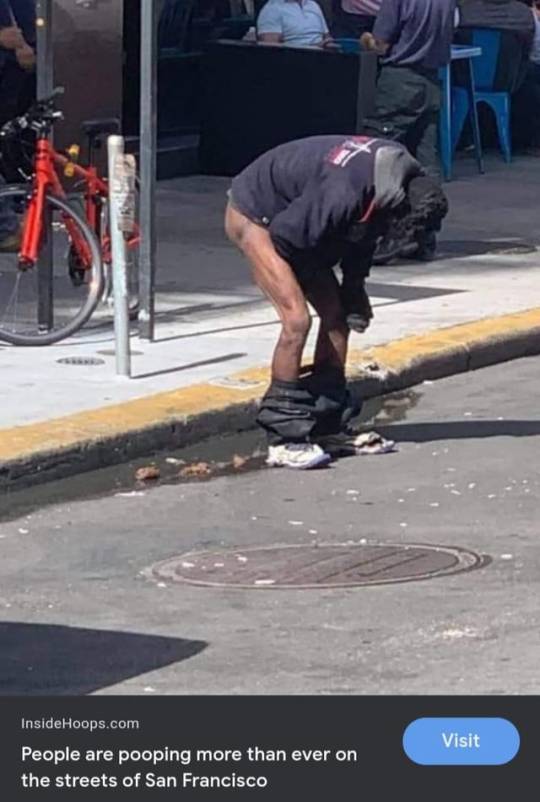
A perfect metaphor for what the progressives have done to America.
356 notes
·
View notes
Text

miss americana & the heartbreak prince
—01. all american girl
—word count: 6.4k
—warnings: none :)
—a/n: this is queued so I'm sound asleep right now but trust when I wake... I will be throwing up about having posted this

It’s nine in the morning on Friday, and the kindergarteners at Robinson Elementary are getting picked up from the gymnasium and taken to their classroom to start their day. It’s nine in the morning on Friday, and their teacher, Chris Elliott, is running four minutes late to the first day of the U.S Grand Prix. Her fingers flatten down stray flyaways, working in tandem with the extra strength hairspray she found in the back of the Walgreens beauty aisle last night. Her makeup is strewn about in chaos atop the stark white marble countertops, a single folded piece of toilet paper in the trash can, remnants of her lipstick kissed onto the fibers.
She played it safe on the outfit today, still hasn’t been able to pinpoint exactly what the dress code for this race is supposed to be. Her Dad has been no help–he can get away with wearing jeans and a short-sleeve button-up just about anywhere he goes. More is expected from her, though. Three days, three outfits, always walking the line between casual streetwear and Kentucky Derby without a fascinator. She settled for something painfully classic and American, figured a European sport would be eating up the concept of everything being bigger in Texas. Levi’s, a white tank top, and a beat up pair of cowboy boots should do a good enough job at letting anyone curious know she’s authentically American, without screaming out for attention. That’s the goal for the weekend; blend in and keep Dad company.
Dad, who is not-so patiently tapping his foot against the floor, watching pre-race coverage of the Dixie Vodka 400 on his iPhone 7, is a guest of honor for Ferrari this weekend. It was a classic Bill Elliott commitment, one he makes and then forgets about until he’s getting sent an email a month ago to remind him. One he makes when he forgets his son is racing the same weekend. That’s how Chris ended up here with him, instead of her Mom or instead of Chase or Chandler. They’re all in Florida for the Cup Series. Well–Chandler isn’t. Chandler’s at her hot-shot job in the big city living her life blissfully away from racing.
She can count on a single hand the amount of times her dad has missed a Cup Series race in the years since his retirement. Even if he’s moved on from driving the track, racing is in Elliott blood. It comes easier to them than breathing does. Chris won’t be the first to admit it, but she's the NASCAR nepotism equivalent of a Baldwin baby. She’s no Kennedy, the first-families of NASCAR are closer to the Petty’s and the Earnhardt’s, but, you ask a NASCAR fan about the Elliott Clan and you’re sure to get an earful. Champion, Hall-of-Fame inductee father, supergenius transmission and engine mechanic uncles, and a superstar fan-favorite older brother, the Elliott family racing history spans generations of fans.
Never the Danica Patrick-type, Chris has always preferred to watch the races rather than compete in them, but she still grew up at the track and was always up for a trip to visit her dad at the auto-shop.
“Mums,” her dad says, peeking his head around the corner into the hotel bathroom. It’s a stupid nickname, Mums, Chrysanthemum. She’d roll her eyes if it was anyone but Bill still calling her by it. “We gotta go, darlin’.” Chris nods at him in the mirror, flattens her hands along her thigh and tucks one final strand of her bang behind her ear, and then they’re finally leaving the hotel for the track.
It’s a strange kind of first for Chris, in that it’s not really a first at all. She’s been to COTA before, multiple times. Hell, she watched in the garage when Chase won the inaugural Cup Series race here in May last season. She’s even been to the U.S Grand Prix before, back when it was still in Indianapolis, when Chris was too young to remember if it was big or if she was just little. She’s used to the crowds, spends almost every weekend with upwards of fifty-thousand people, but this? This is the kind of crowd she can’t fathom being among, and it’s only Friday. If it takes them an hour and a half to get through traffic on a practice day, she can only imagine what the next two mornings have in store for her.
“No antics today,” Bill tells her in the car. “They’re not like us. Trust me, I know.”
Last time you went to one of these races, you were still a driver, she wants to tell him, but doesn’t. He doesn’t take well to the implication he’s an old man. Walking into the paddock with a yellow pass hung around her neck, FERRARI-GUEST-17 and a picture of the team logo popping up on the screens at the turnstiles, she’s beyond taken back by the pomp and circumstance of it all. She’s barely through the entrance and she’s already spotted half a dozen people who could buy her without it making a dent in their pockets. It’s nothing like walking around a NASCAR track. There isn’t a single Bud Light knight or backs sunburnt into American flags or t-shirts turned muscle tanks. It’s just… rich people. Lots and lots of rich people.
In the Paddock Club tent, Bill manages to find a couple of his old buddies. Guys he raced with back in the day who’ve turned up for whatever with whoever this weekend. It’s unsurprising, stock car racing is nowhere near as exclusive a club as Formula One. They aren’t any of the guys Chris remembers being a part of her childhood, none of them pseudo-uncles in the way some other drivers were. You’re all grown up, they tell her, note her height and her features and one of them even asks if she’s in college yet. She plays along, pretends she remembers them fondly and that they haven’t been on the recipient list for the annual Elliott family Christmas newsletter for the past thirty or so years. His buddies are much more comfortable talking about Chase, anyways, about his racing and his fiancee and his little boy than they’ve ever been talking about Chris or Chandler. The concept of a quote-en-quote girl dad wasn’t such a thing in the nineties.
Chris makes small talk with one of the wives. They can’t be that far apart in age, she’s definitely of a different generation than her husband. Gross. Chris lets the woman lead the conversation; she talks about the polka dots on her skirt and Chris’ cowboy boots that are, apparently, perfectly authentic.
They separate from the group of former NASCAR drivers and their child brides within the hour. Bill has to be in Ferrari hospitality by one o’clock for a special meeting. He’s still not sure what he did to get selected for this specific group of people who get to do a hot lap with one of the Ferrari drivers, but he isn’t about to ask any questions that might get him out of it. He sets off to hospitality and Chris sneaks out of the paddock and into the rest of the track.
There’s only so much to see inside the paddock. Hospitality after hospitality after hospitality, just in different colors with different modern structures with pictures of different cars. She wants to experience the event, not just the rich people who can pay their way into the upper echelon of the pinnacle of motorsport. If she’s going to be on her own for an hour and a half, she might as well be fully and truly on her own.
She ends up in the beer garden. More specifically, the bar tent. You can’t separate a NASCAR fan from the Natty Light. The pass around her neck gets her into the VIP area of the tent, which… feels like an antithesis of itself. Her phone buzzes in her back pocket when she’s waiting on her bottle from the bartender. It’s her dad.
Brad Pitt is here. Crazy.
She makes quick acquaintances with a couple who looks about her age. She compliments the girl’s denim jacket and then she’s in. The DJ is playing country music with a techno backtrack at the other side of the tent and they all three spend a good fifteen minutes trying to decide if they love or hate the set. “It’s not the worst thing I’ve ever heard,” the guy says.
“It’s definitely not the best, though,” Chris winces, spots a Ferrari pass hanging with the VIP one around the girlfriend’s neck. “Are you guys here with Ferrari?” She asks.
“Oh, “ she says, looks down at the pass and fiddles with it for a moment. “Yeah, Will’s a golfer and they invited him for a tour and to do this golf event with ESPN.”
“Oh, that’s sick!” Chris nods. “Have you guys ever been here, or is this your first time?”
“We’ve come every year for…” Will starts, looks to his girlfriend for the rest of his sentence.
“Four years,” she nods. “What about you?”
“This is my first time,” Chris explains, leaves out the technicalities because she barely cares about them, doesn’t expect a stranger to even half-care. “My dad’s here with Ferrari, and I’m here to babysit my dad.” She laughs.
The woman nods, makes a quiet ah sound. Will asks for clarification. “You guys lose each other, or something?”
Chris nods. “Or something.”


Charles sees her before he hears her. She appears in his peripheral on the top floor of Ferrari Hospitality, moving swiftly through the groups of strangers with a confidence that makes you think she owns the place. He half-prepares to excuse himself from his current conversation–not that he’s understanding more than forty-percent of the words coming out of this guy’s mouth–to take a photo with the short brunette bee-lining it over to him.
“Excu–”
“I think I saw Brad Pitt on my way here,” she says, and the man he’s been talking to for fifteen minutes laughs. Oh, he thinks, that’s mortifying. She’s not here to intrude on his conversation and ask for a picture. She’s here with this guy.
“This is my Chris,” Bill says.
“Hi,” Chris says. Chris. Chris. Chris is a woman. A woman extending her hand, thin and well manicured with a single ruby ring, for him to shake. “Chris.”
“Charles,” he says, hesitates. “You are not what I was expecting.”
There wasn’t much he understood from Bill Elliott during their hot lap, not that Bill didn’t talk. Charles just didn’t have the focusing capabilities to drive the car in an entertaining way while also deciphering the thick southern drawl of the man sat in the passenger seat. It was thick, heavy, and sounded like maybe he’d smoked a pack a day for a few years. That, or he was straight-up making up words in a bit that only he was in on. One thing he did understand, though, was the kids’ names. I have three, he’d said, Chandler, Chase, and Chris. He’d assumed all boys. Chandler, Chase, and Christopher. Christian. Cristiano. The last thing he was expecting was a beautiful girl with a firm handshake.
“You were expecting me?” She asks, and her voice is a million times easier to understand than her father’s.
“No, no. He just,” He gestures absently to Bill. Chris doesn’t break eye contact. She has wonderful eyes. “I thought Chandler, Chase, and Chris are three brothers.”
“Oh,” She laughs like it’s not even close to the first time she’s had to follow behind her dad and correct the miscommunication, and a piece of her bangs falls loose from its tucked position behind her ear. She fixes it without thought. “Well, you’re one for three.”
She asks Bill about the hot lap, asks if he had fun and he laughs. They’re very laugh-oriented people, he’s noticed. Laughy and almost intimidatingly good at holding eye contact. He’d always heard Americans had an issue with eye contact, and if that really is the case, these two practice their active-listening skills enough for the rest of the country. Their kindness is in their expressions, soft eyes and small smiles that keep you from feeling like an intrusion on the conversation. He notes all of his findings internally, categorizes them together as if he’s spent the last ten minutes looking at anyone but her.
She’s horrendously his type. It’s painfully apparent with every passing moment. The hair and the face and the build and the smile. Just, God.
“Why didn’t you do one?” He asks, “A lap?”
“The need-for-speed bug skipped the women in my family, unfortunately.” She tucks her hair again. He wonders if she’s growing it out or if she always keeps it at such a length that it’s just too short to stay where she wants it to.
“We could go slow,” he offers and she chuckles, closing her eyes long enough to roll them without him actually seeing them roll.
“I don’t believe you.”
“It’ll be fun, I promise.” He’s never been good at flirting, always found it off-putting in the beginning, trying to walk the line between what one person finds fun and another person finds horribly uncomfortable. Once the dust settles, he can manage, but making those first few moves? He might as well be a deer in headlights. Semi-truck headlights.
“I don’t know,” she says, drags out the vowel sounds and he’s oblivious to whether or not she can tell he’s only making this offer as a chance to spend more time with her. He’ll get an earful for it, no doubt, but if she agrees it’ll be worth it. Bill chimes in, eggs her on with a guilt trip. You should do it, don’t be a party-pooper. Charles wonders if Bill can tell he’s flirting with his daughter. Probably not, he’d bet. “Okay,” she says, and his stomach does a celebratory flip. Before he can say anything more, Mia is pulling him off somewhere. He hadn’t even seen her coming, but he fills her in on the walk.
“Domani c'è un'aggiunta al programma dei giri veloci.” There’s an addition to the hot laps schedule tomorrow, he says. Mia glares at him and he pretends not to notice, flashes her a toothy-grin as an unapologetic apology.
When she’d agreed to do a hot lap with the gorgeous racing driver standing a foot away from her, she assumed it would be forgotten the moment he stepped away from the conversation. She never would have agreed to it if she actually thought it was going to happen. Chris was sorely mistaken though, when later that afternoon, a man dressed head-to-toe in Ferrari red finds her to gather her information. 1:10, he tells her through a thick Italian accent, be in hospitality at 1:10.
It was wonderful, really. Perfect, fantastic, great, legendary. This is an amazing opportunity. She isn’t going to regret agreeing to this, no chance. Even for the queen of optimism, this one is hard to put a positive spin on.
There is no underestimating just how much Chris hates going fast. She’s never liked it, spent the majority of her childhood getting carsick in a vehicle maxing out at forty miles an hour. Her sister and brother used to think she was faking it just so she could always ride shotgun. She’s not even allowed to drive the car if she’s with her dad or her brother because they can’t bear it. To her, a speed limit is just that, a limit. To everyone else, it’s a minimum.
Her only hope is that she doesn’t vomit all over an expensive supercar at 1:10 tomorrow afternoon, or worse–the cute guy driving the car.
In the meantime, she can distract herself with the Green Day performance and remind herself that only so much can happen in five minutes. Anyone can survive five minutes.
– – –
They eat the continental breakfast at the hotel the next morning. Bill has pancakes and Chris has cereal because, as she’ll tell anyone, there’s just something about cereal from a plastic container. She’s also three coffees ahead of where she was this time the day before, all of her nerves personifying themselves as desperation for caffeine. She’s responding to a work email on her phone while Bill has a call with Chase.
Somewhere on a race track in Florida, Chase is calling between practice and qualifying sessions. They talk every day during a race weekend–Bill and Chase–and it’s almost never about racing. Her dad might drop an occasional that’s not what I would’ve done or a well, that looked like fun, but that’s usually the end of race-talk. They used to fight like cats and dogs about driving when Chase was younger, so much so that Chris’ mom banned them from talking about racing inside the house for three straight years. The who of them are better now, now that Bill’s been able to let Chase find his own way and go through his own racing journey.
“Your sister is doing a Hot Lap today,” Bill says, and Chris can hear Chase’s laughter from the muffled speaker.
Bill and Chris are driven to the track on Saturday because traffic is so bad. It’s hot and windy and Chris has her window rolled down the entire drive, her fingers dancing through the dry air. She’s always loved the heat, the sun shining down on her skin, kissing her in a million different places all at the same time. She loves the heat, and the heat loves her.
The morning flies by. They start the day with a tour of the Ferrari garage, where they’re introduced, or re-introduced, to their drivers. They end up with a couple other very important people hunched over Charles’ car while he explains how much pressure needs to be applied to the brake pedal for the car to actually brake. Bill eats the semantics up, cars and their mechanics run thick in his blood, braided deeply into his DNA. Chris, however, has always enjoyed the more delicate things in life; the pink hair bows and the dollar store makeup kits and spinning herself dizzy in a flowy summer dress. She never spent exorbitant amounts of time at Dad’s engine shop or Grandpa’s Ford Dealership, it just wasn’t in her lane of interests. She sips another coffee–her fifth of the day–and listens attentively to Charles talk, bites her smile at his wild gesticulations. He’d make a good kindergarten teacher, she thinks, with his huge personality.
When the whole tour group is being shuffled out of the garage to be replaced by a new set of prying eyes, Charles makes a passing comment. See you later for the world’s slowest hot lap, he remarked, put his hand on her shoulder and gave it a soft squeeze as he moved past her.
She doesn’t know why, but she’d convinced herself that it wouldn’t actually be him she would be doing the lap with. It was qualifying day, after all. Surely, he had about a million and one better things to be doing than driving a random girl around a track a few times. She figured it would be a driver, but not one of the drivers.
After lunch, she makes her way back to Ferrari hospitality, to where she was told to be waiting at 1:10. She’s the only person who looks like they’re here on instruction. Nobody else is nervously picking at their cuticles or vibrating in place as a reaction to their seven coffees that morning.
She spent the night before grilling her dad about his experience, forcing him to give her a moment-by-moment breakdown of everything he remembered happening, from the safety briefing to the conversation afterwards. But, when it came time for Chris to actually do hers, there was no safety briefing warning her about the million different ways she could die. Instead, the same man who’d tracked her down the day before escorted her from the top floor of hospitality to the bottom, out the back into what she can best compare to an alleyway, and then to a red supercharged Ferrari.
Charles is there, talking to what appears to be a personal photographer and another man dressed in Ferrari garb. She re-introduces herself for a third time in twenty four hours. “I know your name, Chris,” Charles says, smiles and shakes her hand anyway. She doesn’t like the way her brain reacts to him saying her name like it belongs on his lips.
“Duh,” she laughs, “sorry.”
“Don’t be.”
“Right,” she nods. “Yeah, sorry.” Charles laughs out a sigh, cocks his head and smiles. Chris bites her tongue not to apologize again. It’s a reflex. She puffs out her laugh and shrugs.
If she manages to make it out of these couple laps with her life and the contents of her stomach still intact, she’s sure to still look like a clown–a fact she realizes as she pulls the tight helmet over her head. She’s worn racing helmets a handful of times, but it’s not muscle memory to her in the way it is to him. It takes her a minute to tighten the chin strap just right and despite his genuine offer to help her, Chris turns him down and blindly works her fingers under her neck until it’s just right.
“Why don’t you get a fun Hot Laps helmet?” She asks while she fights with the strap.
Charles knocks on the side of his helmet with his knuckle. “Custom fit. Safety reasons.”
Chris knows, she was just messing with him. She nods like she never could’ve guessed that was the reason. “My safety doesn’t matter?” She comments, pulls the strap tight for the final time.
“You think I’m going to crash?”
She shrugs. “Maybe.”
“I would never crash with Chris Elliott in the car.” There he goes again, saying her name all annoyingly French and nice and easy.
“Whatever,” she says, turns away so he can’t see her squished cheeks flush pink against the polyester. He opens the passenger side door for her, knocks his knuckle on her helmet this time, and horribly mocks both her words and accent before shutting the door behind her.
Chris has her seatbelt buckled before he can get around the front of the car and into his seat. Her leg bounces anxiously against the floor mat. Charles starts the car and moves to shift into drive, but stops short. “Are you scared?” he asks, and in a moment of vulnerable honesty, she nods. She’s more than scared. She’s terrified, and despite his brief attempt to reassure her that it’s going to be fun, her leg is still bouncing when they peel off from the group already awaiting his return.
A hot lap, she’d come to learn in the last day or so, would be more accurately referred to as hot laps–plural, multiple, several. Three, to be exact. One out lap, one push lap, and one cool down lap. Three laps. Hot laps. They should really start referring to it as a plural.
The best thing she can compare it to is a roller coaster. The turns share the feeling you get at the tipping point, right before your body thinks you’re free falling. Her stomach is left behind three turns back and it never really catches up to the car once they start. The straights are like that first hill, fast and crazy in a way that pulls from her lips screams she hears before she consciously chooses to release. It’s like a roller coaster, if the person sitting next to you is completely unaffected by the ride and spends the entire time trying to carry out a conversation with you between your screams and their giggles. It’s like a roller coaster, if the cart never leaves the ground.
On the cool down lap, when they’re going at a speed that allows Chris to pick up her soul when they drive through turn four, he asks her if she’s single. It comes at her from left field.
“Are you flirting with me?”
He laughs, takes a hand off the wheel and pinches the bridge of his nose. “Yes!”
“Oh,” she says softly. If he notices the surprise in her tone, he doesn’t mention it. “I am.”
“Can I get your number?” She swears that his fingers are shakier than before as they hover over the paddle shift. They were sure-footed just minutes earlier, she’s sure of it. She’s sure of it, but there’s no way it’s a genuine observation. There’s no way she’s making him nervous.
She laughs, because what on God’s green Earth is a European Formula One driver going to do with a small town American girl’s phone number?
“I’m not abandoning my dad for a hookup,” she says, and he rolls his eyes, repeats the question. “Why do you want it?”
“Because, Chris Elliott,” she wants to scrape the way he says her name out of his voice box and pin it in a scrapbook. It’s like a tick, the way it burrows into her skin. Nobody should be allowed to make her name sound like that. “You are a very beautiful girl, and when a guy sees a beautiful girl, they act like an idiot and ask for her number.”
“Oh, my God,” she giggles, shakes her head and looks out the window like it might ground her, or like it might reveal that she really is in some fever dream state and none of this is real. She’s not even in Texas, maybe. That’s how insane this whole conversation is to her.
“Too cheesy?” He asks, grimaces. She shakes her head, holds her hand out for his phone.
“Just cheesy enough.”
When they get back to where they started, someone asks Chris if she’d had a good time. She nods, flattens down the static-electricity charged flyaways on her head and tells them yes, even if she’ll be just a little bit nauseous for the rest of the day. It’s not a lie, either, she did have fun. She was scared out of her mind, but in a way that makes her happy she did it.
They pose for a photo together in front of the car, the picture snapped by the only guy with a camera around his neck, the only one besides Chris not covered head to toe in Ferrari branding. When they pose, Charles’ arm wraps around her lower back and, almost like he remembers himself in the middle of the action, his hand doesn’t close around her side. Instead, it hovers just beyond her body, open and stiff and flat. How gentlemanly. “Good luck tomorrow,” she says.
He nods his thanks, “I hope I see you around this weekend,” he adds, and then they go their separate ways. Good thing, too, because she’s still blushing over it when she gets back to her dad in the Champion’s club. Bill is too distracted by the live feed on Chase’s qualifying laps on his tiny phone screen to notice Chris’ presence, much less the coloring of her cheeks. He qualifies third and they celebrate quietly with drinks from the bar and FP3 on the big screens.
They stumble into more NASCAR old-timers while in the Champion’s Club and Chris spends the time fifth-wheeling their conversations about Chase and watching the second half of qualifying on one of the TVs.
She doesn’t really understand the format of the weekend. In theory, she understands the basics, didn’t have to read Formula One for Dummies on the plane ride over, but the intricacies of it are beyond her. In NASCAR, drivers are split into two groups and then are only given, at max, two laps to set their qualifying times. It varies depending on the track that weekend, but it always hits some of the same points. From what she can gather from the low-volume televisions mounted on every surface around her, F1 is definitely different.
They head back to the hotel directly after qualifying to ‘beat the traffic’ which is code for Chris is still nauseous and they’re both feeling a little too heat exhausted. They stop for dinner on the way back, at a barbeque place right by their hotel. Bill orders the chopped brisket with potato salad and Chris gets the pulled pork sandwich with a tomato zucchini salad.
Chris has been really busy with work, with settling into the new routine with her new group of students, and Bill wants to hear all about it. She always struggles in September and October, feels inadequate every time the other teachers find their footing with their new class weeks before she does. It’s the first time alotta ‘em have been in a school, Bill reminds her and she shrugs it off, tries to find something more upbeat to talk about.
Chris and Bill have really gotten close over the past couple years. Growing up, she and her sister Chandler were massive daddy’s girls, had him wrapped around their little fingers from the moment they came into the world. But, when Chase started to really take racing seriously, the girls lost a lot of their dad to their brother and spent the majority, if not all, of their time with their Mom. As a teenager, Chris did what all sixteen year old girls do and rebelled against any and every rule in the book. While Chandler was touring colleges and getting 1550s on her SAT and singing in the church choir, Chris had other plans. Whether it was stubbornly refusing to clean her half of the shared room with her big sister, ratting Chase out for coming home at 2am drunk, or sneaking out of the second-story window to go out with her all-too-old boyfriend, she tested all of the waters. It wasn’t until college, until she moved away to Athens and was out of the house for the first time in her life that she realized just how important family was to her. She’s been attempting to make up for lost time since.
That night when she plugs her phone into the charger and shuts it off for the night, she realizes she’d been half expecting a late night text from Charles. It didn’t come, and disappointed isn’t the right word for the tiny little pit in her stomach because she wasn’t really expecting anything to come from typing her number into his contacts. It’s not disappointment, it’s something closer to acceptance or rejection, maybe. It’s not like he would’ve been searching out anything but a hookup, anyways, and Chris made it perfectly clear that she wasn’t into that idea.
She would never hear from him again, and that’s how it should be. The whole interaction turning into anything but a story she can tell in a couple months when she’s drunk would be entirely too complicated of an outcome.
She doesn’t let herself think about it any longer, leaves her phone face down on the side table and tucks herself into bed.
– – –
Traffic on race day is true-crime inducing. They’re driven, again, escorted and still spend an hour and a half in the backseat of an SUV. Bill and Chris watch from the VIP stands and Chris has never seen anything like this, especially not at COTA. Even Talladega and Daytona barely hold a candle to this spectacle.
If she has one critique, it’s that F1 should really hire some B-List at best celebrity to scream drivers, start your engines! At the start of the race like they do in NASCAR. It would really add some flare, she thinks.
She and Bill share Chris’ airpods, one in each of their ears listening to the NASCAR broadcast. Charles starts twelfth, for whatever reason. She can’t be bothered to look into it, knows it’ll probably be a penalty she doesn’t understand and she’ll be tumbling down a rabbit hole before she knows what’s happened to her.
While it’s not Chase’s best race–he finishes fourteenth with a single sigh from Bill–Charles puts on a show, fights his tires all the way up into third.
They watch the podium celebrations on the TV screens and nobody looks happy to be up there. They look miserable, almost, and she understands it to an extent. It’s hard to have energy after a race, she’s witnessed it first hand more times than she can count. It’s hard, especially at the end of the season. Burn-out is real, but still. They look bored. She didn’t know spraying champagne could look so tired.
Bill grumpily flies them home to Georgia late Sunday night. He’d wanted to wait until Monday morning, after all the billionaires and their super-jets take off right after the race, but Chris refused to miss another day of work this early in the school year, not when she was already going to be missing time in December for her brother’s wedding.
Bill’s been flying planes since before any of his kids were born. His most recent purchase is a Cessna Conquest II that he uses to fly the family around for short distances. In another gene that skipped the females in the family, Chandler, Chris, and their mom all prefer to be passengers. Chase, however, followed in Dad’s footsteps once more in becoming an avid aviation fan.
By the time they take off, any thought Chris had of getting a text from Charles has faded far into obscurity. He’d probably gotten dozens of numbers from girls this weekend. He was probably at a club somewhere right now still pulling women. Women more his type, probably. He seems like he’d be more into the refined type, the girls without the ‘cheap’ accents who were all worldly and spoke seventeen languages fluently and had long legs that carried them down runways across Europe every other weekend.
Little southern girls get texts from little southern boys, that’s how it goes. That's how it’s always gone, and Chris is beyond naive to think anything different for even a moment.
She grades papers on the flight home. Purple pen, because she thinks that color is fun and red is too cruel to grade with. Puffy stickers for everyone, even the kids who aren’t anywhere near the right track because she doesn’t want anyone to feel less than just because they struggle a bit more. Chris has always been a firm believer that the student is never the problem. If someone isn’t learning what she’s teaching, she needs to adjust the way she teaches it to cater to their learning style.
It’s her job to teach them, not their job to learn.

Joris has been laughing at Charles from the hotel room armchair for fifteen minutes now, beyond entertained by his best friend’s restless pacing, providing absolutely zero aid to his current predicament. This act has been going on for some time now. Charles, pacing for five minutes before pulling out his phone and typing up an opening message to Chris. Each time, he starts to read it out to Joris and then stops himself short, deletes it, and paces for five more minutes.
Hey, Chris. This is Ch–no, that’s stupid.
Sorry it took me a minute to text–absolutely not.
What’s up? It’s Charles, how–someone should just stop him from speaking to women all together.
There’s half a dozen renditions before Joris breaks. “Mate? What is your problem?” He finally asks. “It’s just a girl.”
“I know,” Charles sighs, “I know.”
“Then why can’t you send her a text?”
“Because.” He doesn’t really know why he can’t land on a message, why everything he types sounds entirely too casual or formal or nothing at all like what he would say to another human being. This isn’t a problem that he’s used to having. It’s the in-person flirting that fucks him up, not the texts and DMs and comments. She was just… he doesn’t know what she was. She was just. End of sentence.
It’s no help that he doesn’t know American texting culture, unfamiliar with how long he’s supposed to wait to send a message or what he’s supposed to say in the opening text.
“Here,” Joris says, holds his hand out for the phone. “I’ve got the perfect text.”
“Don’t send it,” Charles warns, but passes the phone to his friend.
“I… won’t,” Joris says slowly, struggling to multi-task. He doesn’t type for more than a few seconds and then hands the phone back to Charles, with the message already sent. Charles’ look of sheer panic is met with a smile and a chef’s kiss from Joris.

She turns her phone off while Bill is shutting the plane engine down in the hangar. Because of his love of aviation, Bill had bought some land out in the woods a couple decades ago and turned it into the family’s private airstrip for their planes. Elliott Field, they coined it, stored all their extra vehicles out on the property. She slips it into her back pocket as her and Bill disembark and lock up the place, and the entire time she can feel it vibrating, the notifications from the hour and a half flight catching up now that she’s on the ground again.
It’s not until she’s in her car that she checks them, pulls her phone out to plug it into the aux and play some music for the drive back to her house. Right at the top of the dozens of notifications is a message from an unknown number with an unfamiliar area code.
[one unread message] the notification reads. She unlocks her phone to check the message.

She closes the messages app on her phone and opens up Spotify, shuffles her favorite playlist. She doesn’t reply to his text, doesn’t know if she wants to or even what she might say back. She’s sleepy, more than ready for bed after a long weekend in the sun, excited to be back with her students bright and early tomorrow morning.
The text from the cute race car driver can wait for another day. An issue for tomorrow, maybe.

masterlist next chapter>

#ma&thbp#AHH FUCKKK#BOO#im scared#charles leclerc#charles leclerc fluff#charles leclerc x reader#formula one#charles leclerc imagine#charles leclerc blurb#charles leclerc fic#f1 fanfic#f1 blurb#f1 imagine#f1 fic#f1#f1 fandom#f1 2023#jumpscare#I hope I forget this is in the queue#so when it flops I dont have to bare the suffering of it
479 notes
·
View notes
Text

Christen Press Is Determined to Reimagine the Way Female Athletes Are Seen
For two-time World Cup winner Christen Press, who made her debut in the U.S. Women’s National Team in 2013, it’s no surprise that women’s sports have been having their moment—both before and throughout these Paris Summer Olympics.
Press, along with her teammate and partner Tobin Heath, have bet big on the public’s love of women’s sports. The duo launched their podcast, The Re-Cap Show, during the 2023 Women’s World Cup—the highest attended in history. It wasn’t their first foray into entrepreneurship in the women’s sports space; they are co-CEOs of Re-Inc, a global community for sports fans and changemakers, which launched ahead of the 2019 World Cup. The Re-Cap Show has amassed a dedicated online fan base, with video clips circulated among Re-Inc's 49,000 YouTube subscribers and 123,000-strong Instagram following.
On The Re-Cap Show, the duo bring fans behind the scenes of professional women’s soccer, both at the international level and in the National Women’s Soccer League (NWSL). They debrief games with high-profile guests such as defender Ali Krieger, previous national team head coach Jill Ellis, current national team captain at the Olympics Lindsey Horan, and Angel City FC co-founder Kara Nortman. Press and Heath also break down and share their own perspectives on buzzy topics like scandals in the NWSL, what it’s like to date your teammate, and the recent cheating saga with the Canadian team.
Press and Heath launched Season 3 of the podcast in June, just in time to document the national soccer team’s journey at the Paris Summer Olympics. For Press—who returned to the pitch for Angel City FC on Thursday for the first time in over two years, after four surgeries to repair her torn ACL—it's up to women’s media to meet this moment and capitalize on it.
TIME delved into the Olympics, The Re-Cap Show, and why this moment in women’s sports is so important during a video interview with Press.
TIME: The momentum for women’s sports right now is immense. Caitlin Clark and Angel Reese enjoyed record-breaking performances in the NCAA last year, and the WNBA opened their 2024 season with their highest attendance in 26 years. This is also the first Olympics with gender parity. How is all of this impacting the way you cover the Paris Olympics with The Re-Cap Show?
Press: You're spot-on that women's sports are having insane momentum right now. For us, all the attention has really increased our mission to reimagine the way women are seen and experienced in sports. We started our show during the World Cup because we’re women soccer players, and that's when we committed to turning on a spotlight [and] never turning it off.
But the Olympics is this huge opportunity to inspire and reveal what's already there: lots of leagues, athletes, and players that are doing their job all-year round, but they get to be at the highest stage this summer. From a business perspective, [it’s about] bringing those supporters, fans, and community members into the women's sports world, which is the most inclusive, diverse, and interesting community that uses sport as a vehicle for change.
Take us back to creating Re-Inc with your teammates Tobin Heath, Megan Rapinoe, and Meghan Klingenberg. How far have you all come since then?
We started Re-Inc in 2019 with a single T-shirt before we went to the World Cup and it said “Liberté, Égalité, Défendez.” It was a play on the French motto [“Liberté, Égalité, Fraternité”] as we had headed to France, so we switched the word “fraternity” to “defend” because as the U.S. Women's National Team, we were defending our title, but we were also defending the principles of liberty and equality.
But since then, it’s grown into a community. Watching women play sports is an act of revolution. Not so long ago, women were not allowed to play sports, and until recently, we were not paid to play sports or paid very well. And so I think as women's sports get heightened, it is just the living and breathing symbol of progress in society that women can rise and be stars on the court and on the field. With launching our media division, we saw how the coverage was failing to represent the lifestyle and culture of us, and it was just a copy and paste from the men's side. The broadcast and the commentary was so off-putting that it was spoiling the sport for us. No one knew how to talk about gal culture.
What kinds of commentary were you used to hearing while you were playing with the U.S. Women’s National Team?
Sometimes, when I'm watching people commentate, I feel like they’re a kindergarten teacher explaining the basics of soccer with the assumption that the person who's watching has no idea what they’re watching.
I think there's a lot that needs to be improved. Also, when it comes to addressing social issues and the institutional prejudice that happens within sports, especially how we talk about Black athletes… The media should make sure you're seeing this vision of a woman athlete in a way that can be a badass—not self-conscious, but laughing loud and really proud of her success. So I think all of those lifestyle and social issues are baked into the game.
And then obviously, as the game grows, we're going to have more expertise and fundamental knowledge and that will just make the broadcast so much better. Part of why the Olympics is so great is because you get the best—the best commentators, the best camera angles—and that's another reason why people will fall in love with all the sports, since it's not, you know, just an iPhone shot of the last 50 meters of a race.
Your former teammate Kelley O’Hara is working with Just Women's Sports. Megan Rapinoe and Sue Bird are bringing back their podcast, A Touch More, and your former teammate Sam Mewis is also hosting her own show, The Women’s Game. Why do you think this is the moment where so many female athletes are working in media?
I haven't heard of another market that people are talking about that is successful right now, other than AI and women's sports. I feel very proud to have started this business five years ago and kind of be positioned as ready for the moment as opposed to reacting to the moment. As athletes, we're all inspiring each other and the businesses that are cropping up are inspired by a desire for all of us to raise the game and continue to have an impact. I'm very proud to be about it, to be a part of it, and to be alongside pioneering women. I think the competition is healthy, and it's necessary. It pushes us and I love that.
Many people view women’s sports as a sacred, safe space—something you talk a lot about on your podcast. Is there any fear that as the women’s game becomes more popular and more fans join, that other energies will enter into the space?
I always say the air gets thinner at the top. I think women's sports is a very diverse, inclusive space. And I actually know that members of the community feel very protective of the space. We have our membership community and our members often speak about protecting the space. There will always be challenges as it gets more mainstream.
That’s why I love doing our show: every week, we're talking about the challenges. We’re talking about how the women's sports community feels about someone's bigoted comment or someone who misrepresented them. And it's a two-way dialogue. I think that's really essential to maintain the integrity.
I remember when the social media scandal with midfielder Korbin Albert—who’s currently on the Olympic roster—came out earlier this year. You and Tobin went straight into talking about it. I think a lot of fans were curious to hear from you about it.
It was hard to talk about that, because we were afraid of someone just clipping a tiny piece of the conversation and, like, missing all the nuance and kind of misconstruing our language, but we thought it was important enough to do it anyway. Nuance is something that's consistently missing from the echo chambers.
What are you hoping the Olympics brings to the world of women’s sports?
Kara Nortman, who is the co-founder of Angel City, always tells a story that she was at the 2015 Women’s World Cup, and was completely moved and inspired by us winning. Then, she came home to try to watch us play, and couldn’t find any games, and she couldn't find jerseys. That’s why she started a women's soccer team. I think that story is so beautiful, because it really emulates what's so special at the Olympics.
I think there's a huge opportunity to uplift sports—even the sports that aren't as popular as women's soccer—and for people to go home and become lifelong fans.
37 notes
·
View notes
Text
Please read the movie descriptions below
Saving Private Ryan (1998) - Following the Normandy Landings, a group of U.S. soldiers go behind enemy lines to retrieve a paratrooper whose brothers have been killed in action. Dir. by Steven Spielberg
A League of Their Own (1992) - American sports comedy drama film that tells a fictionalized account of the real-life All-American Girls Professional Baseball League (AAGPBL) during WWII. Dir. by Penny Marshall
Greyhound (2020) - The film is based on the 1955 novel The Good Shepherd, and follows a US Navy commander on his first assignment commanding a multi-national escort destroyer group of four, defending an Allied convoy from U-boats during the Battle of the Atlantic. Dir. by Aaron Schneider
Mudbound (2017) - The film depicts two World War II veterans – one white, one black – who return to rural Mississippi each to address racism and PTSD in his own way. Dir. by Dee Rees
Twelve O'Clock High (1949) - A tough-as-nails general (Gregory Peck as General Savage) takes over a B-17 bomber unit suffering from low morale and whips them into fighting shape. Based on a novel by the same name. Dir. by Henry King
The Best Years of Our Lives (1946) - three United States servicemen re-adjusting to societal changes and civilian life after coming home from World War II. The three men come from different services with different ranks that do not correspond with their civilian social class backgrounds. It is one of the earliest films to address issues encountered by returning veterans in the post World War II era. Dir. by William Wyler
The Monuments Men (2014) - An unlikely World War II platoon is tasked to rescue art masterpieces from German thieves and return them to their owners. Based on the 2007 non-fiction book The Monuments Men: Allied Heroes, Nazi Thieves and the Greatest Treasure Hunt in History. Dir. by George Clooney
Dunkirk (2017) - Allied soldiers from Belgium, the British Commonwealth and Empire, and France are surrounded by the German Army and evacuated from Dunkirk. It is shown from the perspectives of the land, sea, and air. Dir. by Christopher Nolan
Fury (2014) - A grizzled tank commander makes tough decisions as he and his crew fight their way across Germany in April, 1945. Dir. by David Ayer
Valkyrie (2008) - A dramatization of the July 20, 1944 assassination and political coup plot by desperate renegade German Army officers against Adolf Hitler during World War II. Dir. by Bryan Singer
50 notes
·
View notes
Text
Meghan Markle's Top 10 BLACKEST Moments! 💁🏾♀️
10. Talking Black hair care with Mariah Carey on her podcast (Girrrl...not Murray's & Pink Lotion!! 😆)
9. Helping Black & Brown women of the Hubb Community Kitchen after the Grenfell Tower Tragedy as her first solo royal project.
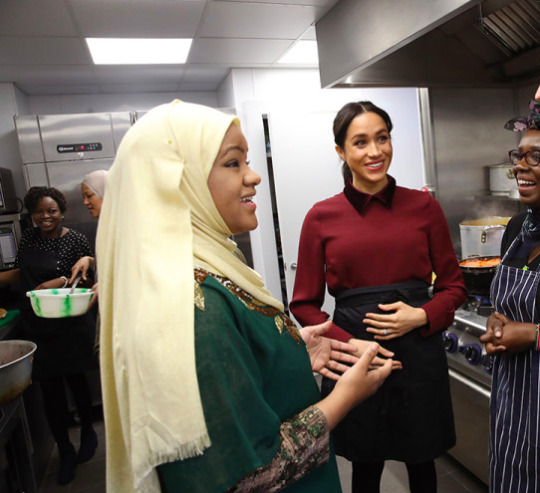
8. When she reminded err'body on “Suits” that she is NOT a white girl!!!
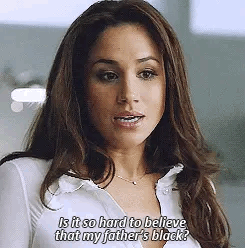

...And then shutting down corny-ass haters on Twitter for continuing to question her Blackness.
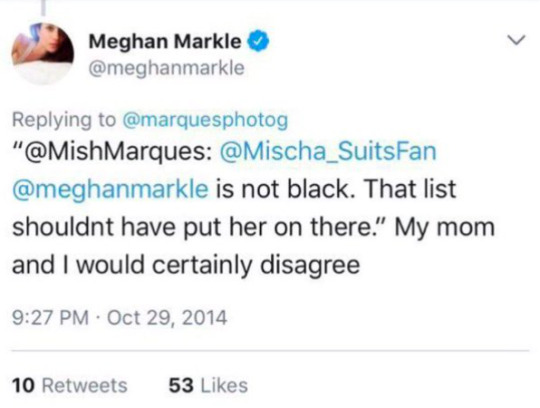
7. When Meghan and her husband's Archewell Foundation supported The Loveland Foundation, an organization that gives Black women and girls across the U.S. access to high quality therapy and support.
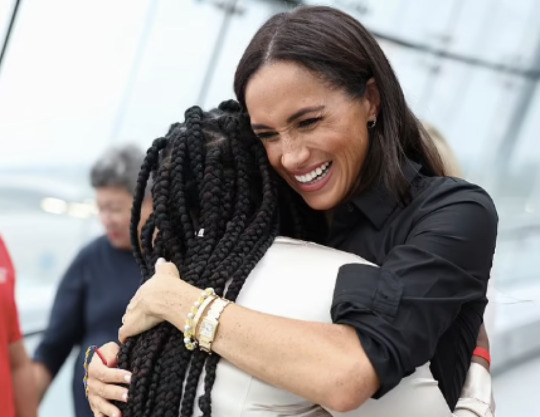
6. Sporting all-Black designers while giving us 'bundles on bundles' at the NAACP Image Awards.

5. Taking part in the "Erase The Hate" campaign condemning anti-Black racism.

4. When she FINALLY met King Bey and gave us the vision of Black royalty & Black excellence we kneegrows deserve!
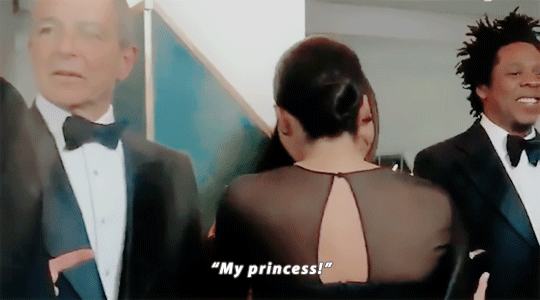
3. When she said "Black Lives Matter" and spoke out on the death of George Floyd.
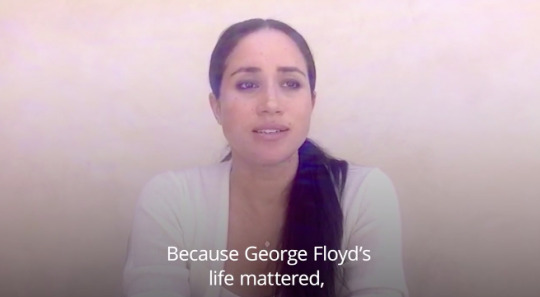
2. Becoming a real-life B.A.P. and marrying into the British Royal Family - a.k.a. the WHITEST family in the world. Sis was late, only invited her Black mama who proudly wore her locs and nose ring. Had a Black pastor preach, hired an afro-wearing cello player and an all-Black choir to sing...all on Malcolm X's birthday! 👸🏾

1. And chile, when sis exposed those same crumpet-eating colonizers on that Oprah special...ICONIC!!!

Happy Black History Month, y'all!! ❤️🖤💚
#meghan markle#duchess of sussex#black woman#black women#african american#mixed race#biracial#i love her#happy black history month#for the culture#black culture#black royalty#non blacks dni#british royal family#prince harry#black history#racism#misogynoir#anti blackness#blackest moments#suits#rachel zane#beyoncé#sbrown82
71 notes
·
View notes
Text
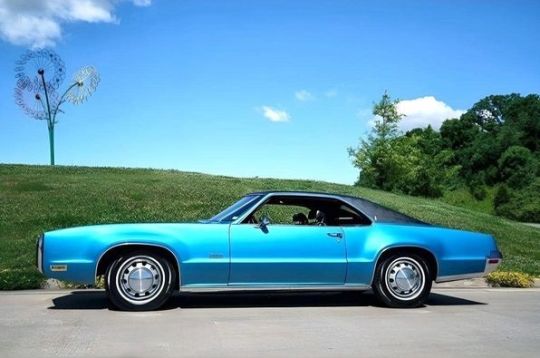
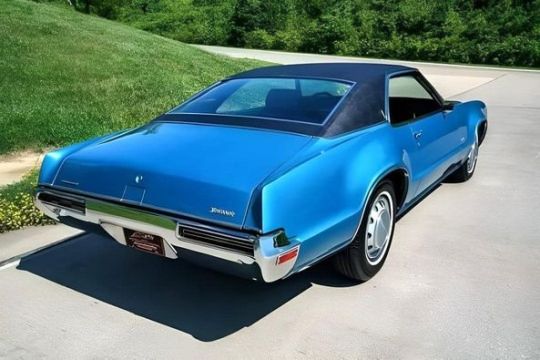
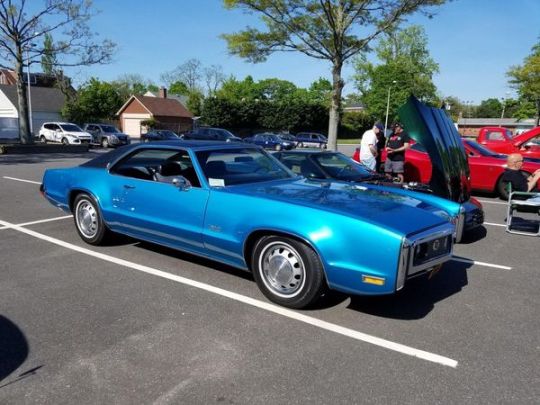
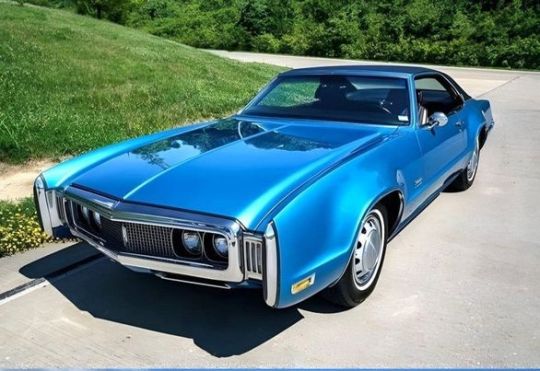
1970 Oldsmobile Toronado
The ultimate luxury car 1970 Oldsmobile Toronado
First generation 1966 - 1970
The Oldsmobile Toronado is a personal luxury car manufactured and marketed by the Oldsmobile division of General Motors from 1966 to 1992 over four generations.
The Toronado was noted for its transaxle version of GM's Turbo-Hydramatic transmission, making it the first U.S.-produced front-wheel drive automobile since the demise of the Cord in 1937.
Sharing the GM E platform introduced by the rear-wheel drive Buick Riviera in 1963 and adopted for the front-wheel drive 1967 Cadillac Eldorado, the three models shared the E platform for most of the Toronado's 26-year history.
The name "Toronado" had no prior meaning and was originally selected for a 1963 Chevrolet show car.
The 1967 Toronado's 425 cubic-inch Super Rocket V8 engine
The Toronado began as a design painting by Oldsmobile stylist David North in 1962. His "Flame Red Car" was a compact sports/personal car never intended for production.
46 notes
·
View notes
Text
Andrea Hsu at NPR:
Hours before their final game of the season, the Dartmouth men's basketball team has voted to join a union, becoming the first unionized college sports team in the U.S. and opening many thorny questions about the future of college sports.
Led by Dartmouth forward Cade Haskins and guard Romeo Myrthil, the 15 players announced their intent to unionize last September, arguing that the business of college sports is different that it was a few years ago. Tuesday's vote was 13 to 2 in favor of joining SEIU Local 560.
"Today is a big day for our team. We stuck together all season and won this election," wrote Haskins and Myrthil in a statement. "Let's work together to create a less exploitative business model for college sports."
The election was held over the objections of the Trustees of Dartmouth College, which last week filed a motion asking the National Labor Relations Board to halt the election pending further review. The NLRB denied that request.
On Tuesday, Dartmouth asked the NLRB to overturn the decision by the agency's regional director to hold the election in the first place, setting the stage for a protracted legal fight.
Are college athletes employees?
At the heart of this election was the issue of whether college athletes should be considered employees and therefore have to the right under federal labor law to form unions and collectively bargain over pay and benefits.
In the student newspaper, Haskins and Myrthil said they believe they should be compensated the same as other student employees. Being paid for the time they spend on the sport "would alleviate the need for second jobs and enhance our experience as part of the Dartmouth community," they wrote.
A union would also allow them to negotiate better health care benefits, to cover out-of-pocket costs incurred as a result of injuries sustained while playing for the school, the players argued.
In a ruling last month, NLRB regional director Laura Sacks concluded that an employer-employee relationship does exist between the Dartmouth basketball players and the college. She found that the players perform work that benefits their school through things like alumni donations and publicity, that the players are compensated for that work in nonmonetary ways, and that Dartmouth exercises a lot of control over that work. Her ruling paved the way for Tuesday's election.
Dartmouth College's men's basketball team is the first college basketball team to be unionized, as they voted to join SEIU Local 560.
See Also:
Daily Kos: Dartmouth men's basketball team makes history by becoming first US college sports team to unionize
#Unionization#Unions#NLRB#College Sports#College Basketball#Men's College Basketball#SEIU Local 560#SEIU#Dartmouth College#Dartmouth Big Green#Labor#Workers' Rights
44 notes
·
View notes
Text

LETTERS FROM AN AMERICAN
August 20, 2024
Heather Cox Richardson
Aug 21, 2024
At Chicago’s United Center today, the delegates at the Democratic National Convention reaffirmed last week’s online nomination of Kamala Harris for president. The ceremonial roll-call vote featured all the usual good natured boasting from the delegates about their own state’s virtues, a process that reinforces the incredible diversity and history of both this land and its people. The managers reserved the final slots for Minnesota and California—the home states of Democratic vice presidential candidate Tim Walz and presidential candidate Kamala Harris, respectively—to put the ticket over the top.
When the votes had been counted, Harris joined the crowd virtually from a rally she and Walz were holding at the Fiserv Forum in Milwaukee, Wisconsin. Last month the Republicans held their own national convention in that venue, and for Harris to accept her nomination in the same place was an acknowledgement of how important Wisconsin will be in this election. But it also meant that Trump, who is obsessed with crowd sizes, would have to see not one but two packed sports arenas of supporters cheer wildly for her nomination.
He also had to contend with former loyalists and supporters joining the Democratic convention. His former press secretary, Stephanie Grisham, told the Democratic convention tonight that when the cameras are off, “Trump mocks his supporters. He calls them basement dwellers.” Grisham endorsed Harris, saying: “I love my country more than my party. Kamala Harris tells the truth. She respects the American people and she has my vote.”
Trump spoke glumly to a small crowd today at the Livingston County Sheriff’s Office in Howell, Michigan.
It was almost exactly twenty years ago, on July 27, 2004, that 43-year-old Illinois state senator Barack Obama, who was, at the time, running for a seat in the U.S. Senate, gave the keynote address to that year’s Democratic National Convention. It was the speech that began his rise to the presidency.
Like the Democrats who spoke last night, Obama talked in 2004 of his childhood and recalled how his parents had “faith in the possibilities of this nation.” And like Biden last night, Obama said that “in no other country on earth, is my story even possible.” The nation’s promise, he said, came from the human equality promised in the Declaration of Independence.
“That is the true genius of America,” Obama said, “a faith in the simple dreams of its people, the insistence on small miracles.” He called for an America “where hard work is rewarded.” “[I]t's not enough for just some of us to prosper,” he said, “[f]or alongside our famous individualism, there's another ingredient in the American saga.”
He described that ingredient as “[a]belief that we are connected as one people. If there's a child on the south side of Chicago who can't read, that matters to me, even if it's not my child. If there's a senior citizen somewhere who can't pay for her prescription and has to choose between medicine and the rent, that makes my life poorer, even if it's not my grandmother. If there's an Arab American family being rounded up without benefit of an attorney or due process, that threatens my civil liberties. It's that fundamental belief—I am my brother's keeper, I am my sister's keeper—that makes this country work. It's what allows us to pursue our individual dreams, yet still come together as a single American family. ‘E pluribus unum.’ Out of many, one.”
Obama emphasized Americans’ shared values and pushed back against “those who are preparing to divide us, the spin masters and negative ad peddlers who embrace the politics of anything goes.” He reached back into history to prove that “the bedrock of this nation” is “the belief that there are better days ahead.” He called that belief “[t]he audacity of hope.”
Almost exactly twenty years after his 2004 speech, the same man, now a former president who served for eight years, spoke at tonight’s Democratic National Convention. But the past two decades have challenged his vision.
When voters put Obama into the White House in 2008, Republicans set out to make sure they couldn’t govern. Mitch McConnell (R–KY) became Senate minority leader in 2007 and, using the filibuster, stopped most Democratic measures by requiring 60 votes to move anything to a vote.
In 2010 the Supreme Court handed down the Citizens United v. Federal Election Commission decision, declaring that corporations and other outside groups could spend as much money as they wanted on elections. Citizens United increased Republican seats in legislative bodies, and in the 2010 midterm elections, Republicans packed state legislatures with their own candidates in time to be in charge of redistricting their states after the 2010 census. Republicans controlled the key states of Florida, Wisconsin, North Carolina, Ohio, and Michigan, as well as other, smaller states, and after the election, they used precise computer models to win previously Democratic House seats.
In the 2012 election, Democrats won the White House decisively, the Senate easily, and a majority of 1.4 million votes for House candidates. Yet Republicans came away with a thirty-three-seat majority in the House of Representatives. And then, with the 2013 Shelby County v. Holder decision, the Supreme Court gutted the Voting Rights Act, making it harder to protect Democratic voters.
As the Republicans skewed the mechanics of government to favor themselves, their candidates no longer had to worry they would lose general elections but did have to worry about losing primaries to more extreme challengers. So they swung farther and farther to the right, demonizing the Democrats until finally those who remain Republicans have given up on democracy altogether.
Tonight’s speech echoed that of 2004 by saying that America’s “central story” is that “we are all created equal,” and describing Harris and Walz as hardworking people who would use the government to create a fair system. He sounded more concerned today than in 2004 about political divisions, and reminded the crowd: “The vast majority of us do not want to live in a country that’s bitter and divided,” he said. “We want something better. We want to be better. And the joy and the excitement that we’re seeing around this campaign tells us we’re not alone,” he said.
And then, in his praise for his grandmother, “a little old white lady born in a tiny town called Peru, Kansas,” and his mother-in-law, Marion Robinson, a Black woman from the South Side of Chicago, he brought a new emphasis on ordinary Americans, especially women, who work hard, sacrifice for their children, and value honesty, integrity, kindness, helping others, and hard work.
They wanted their children to “do things and go places that they would’ve never imagined for themselves.” “Whether you’re a Democrat or a Republican or somewhere in between,” he said, “we have all had people like that in our lives:... good hardworking people who weren’t famous or powerful but who managed in countless ways to leave this country just a little bit better than they found it.”
If President Obama emphasized tonight that the nation depends on the good will of ordinary people, it was his wife, former first lady Michelle Obama, who spoke with the voice of those people and made it clear that only the American people can preserve democracy.
In a truly extraordinary speech, perfectly delivered, Mrs. Obama described her mother as someone who lived out the idea of hope for a better future, working for children and the community. “She was glad to do the thankless, unglamorous work that for generations has strengthened the fabric of this nation,” Mrs. Obama said, “the belief that if you do unto others, if you love thy neighbor, if you work and scrape and sacrifice, it will pay off. If not for you, then maybe for your children or your grandchildren.”
Unlike her husband, though, Mrs. Obama called out Trump and his allies, who are trying to destroy that worldview. “No one has a monopoly on what it means to be an American,” she said. “No one.” “[M]ost of us will never be afforded the grace of failing forward,” she said. “We will never benefit from the affirmative action of generational wealth. If we bankrupt a business…or choke in a crisis, we don't get a second, third, or fourth chance. If things don't go our way, we don't have the luxury of whining or cheating others to get further ahead…we don't get to change the rules so we always win. If we see a mountain in front of us, we don’t expect there to be an escalator waiting to take us to the top. No, we put our heads down. We get to work. In America, we do something."
And then Mrs. Obama took up the mantle of her mother, warning that demonizing others and taking away their rights, “only makes us small.” It “demeans and cheapens our politics. It only serves to further discourage good, big-hearted people from wanting to get involved at all. America, our parents taught us better than that.”
It is “up to us to be the solution that we seek.” she said. She urged people to “be the antidote to the darkness and division.” “[W]hether you’re Democrat, Republican, Independent, or none of the above,” she said, “this is our time to stand up for what we know. In our hearts is right. Not just for our basic freedoms, but for decency and humanity, for basic respect. Dignity and empathy. For the values at the very foundation of this democracy.”
“Don’t just sit around and complain. Do something.”
LETTERS FROM AN AMERICAN
HEATHER COX RICHARDSON
#Letters From An American#Heather Cox Richardson#politcal history#grace#poetry#Democratic National Convention#The Obamas#history#American History#Citizens United
23 notes
·
View notes
Text
A lot of lefties blasting RayGun for taking a spot at the Olympics instead of someone who could actually breakdance didn't say shit when this guy took the spot instead of a WOC and then made cutesy hand signals after bombing out.
Laurel Hubbard has made history by becoming the first openly transgender athlete to compete in an individual event at the Summer Olympics. The New Zealand weightlifter did not make the podium, after failing to advance to the final.
Competing in the 87+kg class on Monday, Hubbard struggled to lift 125 kg (275 pounds), putting her out of the running. Her official result is "did not finish," as she bowed out after failing to record a clean lift in the snatch section of the two-part competition.
Hubbard had seemed to successfully lift the weight in her second of three attempts, but in a split decision, the judges ruled she had not held the bar steady above her head.
Despite not reaching the final round, Hubbard smiled and cupped her hands together in a heart gesture before walking off the stage at the Tokyo International Forum.
"My performance wasn't what I had hoped, but I'm humbled by the support I've received from so many people around New Zealand," she said, adding, "I am aware that my participation has been controversial."
"Thank you to the IOC for living up to the Olympic values and showing that sport is for all and that weightlifting can be done by all types of people," Hubbard said.
In her emotional farewell, Hubbard also thanked Japan for hosting the Games, according to her country's Olympic committee.
Trans athletes have reached new heights in Tokyo
Hubbard joins Canada's Quinn, a midfielder on the country's national soccer team who is transgender and nonbinary, in reaching new heights for trans athletes at the Tokyo Games. Quinn, a veteran of the women's team who came out last year and uses one name, recently became the first openly trans person to compete in an Olympics.
Hubbard made headlines when the International Olympic Committee cleared her to compete — a decision that has sparked both support and criticism. For her part, Hubbard has welcomed the chance to compete on the world stage while also showing her true self.
"I commend the IOC for its commitment to making sport inclusive and accessible," she said on Friday. After Monday's loss, Hubbard also thanked the International Weightlifting Federation.
"They have been extraordinarily supportive," she said. "I think that they, too, have shown that weightlifting is an activity that's open to all the people of the world."
She took 15 years off from lifting
When she was in her 20s, Hubbard was a rising star in men's weightlifting, but she quit the sport, she recently said, after struggling with "the pressure of trying to fit into a world that perhaps wasn't really set up for people like myself."
She began transitioning in 2012 — and after a hiatus of more than 15 years, she started working toward a return to competitive weightlifting.
Hubbard, 43, is 10 years older than any other athlete who was in her Group A heat at Monday's competition.
The gold was won by China's Li Wenwen, the world-record holder in the event. Team USA's Sarah Robles won bronze. It's the second bronze for Robles, who in 2016 broke a long Olympic drought for U.S. weightlifting.
"Samoa Prime Minister Tuilaepa Sailele's anger was palpable after Hubbard claimed gold at the Pacific Games over Samoa's Feagaiga Stowers, who took home silver.
"This fa'afafine [a Samoan third gender] or man should have never been allowed by the Pacific Games Council president to lift with the women," Mr Tuilaepa told the Samoa Observer."
In case anyone whinesxabout TIMs bring oppressed this Hubbards father, a successful businessman and politian
#Olympics#Laurel Hubbard#RayGun#If your mad that RayGun used her privilege to steal a spot in the Olympics from talented dancers then you should feel the same about Hubbar#Feagaiga Stowers should have been in the 2020 Olympics
31 notes
·
View notes
Text
Happy Anniversary Little Caesars!
Little Caesars was established at 32594 Cherry Hill Rd.
May 8th 1959, in Garden City, Mi.
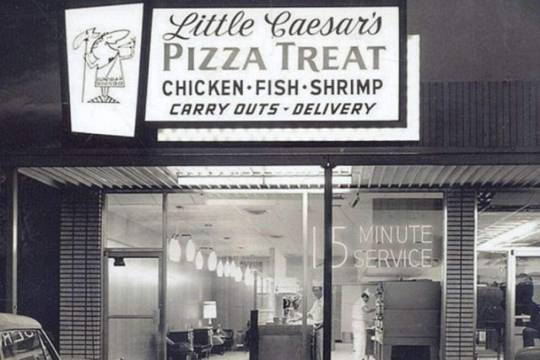
Mike Ilitch played second base for the Tigers and a couple of other teams beginning in 1952.....thanks to a knee injury, he had to retire in 1955.
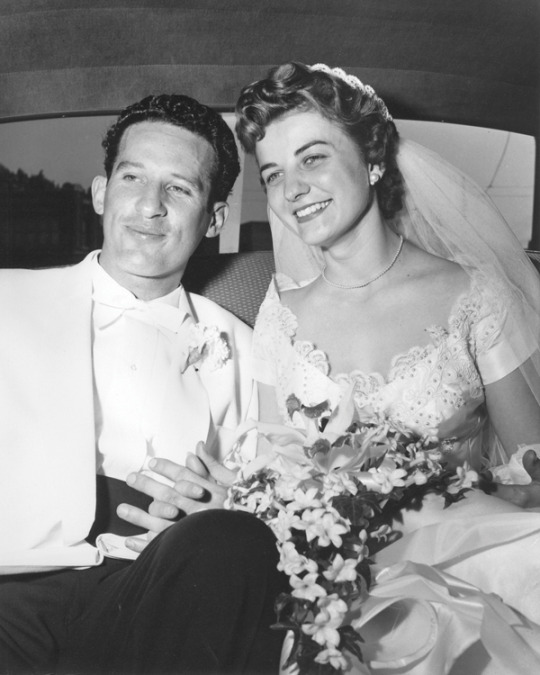
Little Caesars' history says it all began as a love story in 1954, when Ilitch and Marian Bayoff were thrown together on a blind date by Mike's dad. Fortunately, they hit it off, and it was just a few months later when they married. The two of them pooled their life savings in order to open their own business: a pizza restaurant.
1962 Little Caesars first franchise opened in Warren, called “Little Caesars Pizza Treat”. This featured the “Little Caesar guy eating a slice of pizza” logo. From there, Little Caesars really began to branch out and became the fastest-growing pizza chain in America.
That single mom-and-pop pizza shop grew into the third largest pizza chain in the world with stores in more than 27 countries and territories worldwide, including in each of the 50 U.S. states.
The growth of Little Caesars helped Mike and Marian create other leading brands in the food, sports and entertainment industries.
The couple purchased the Detroit Red Wings in 1982. While the team was known as the Dead Wings at the time, Mike and Marian believed they were a sleeping giant and immediately took charge to turn the team around. By 1997, the Red Wings won their first Stanley Cup in 42 years, and they went on to win three more.
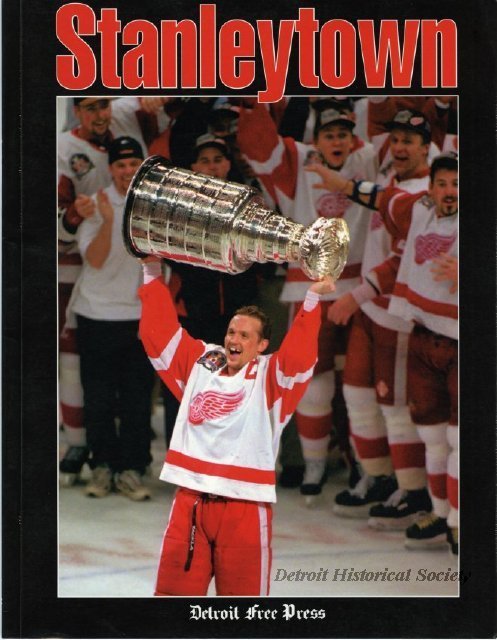

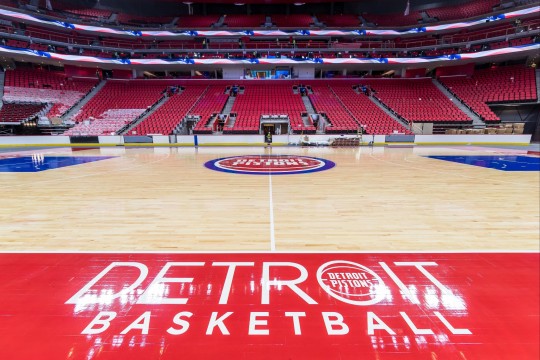
Mike encouraged the Ford family to bring the Detroit Lions back to Detroit from the suburbs and build a new stadium right next door to the ballpark by relinquishing a portion of land to make way for the new stadium. The new football venue allowed Detroit to host the Super Bowl in 2006.
Today - true to Mike and Marian's vision for a bustling downtown area - the Ilitch organization is developing The District Detroit, a dynamic urban destination that provides a dense neighborhood experience featuring a variety of developments alongside Detroit's premier sports and entertainment venues. This includes the new highly innovative and state-of-the-art Little Caesars Arena, home of the Detroit Red Wings and Detroit Pistons, and the recipient of the 2018 Sports Facility of the Year award, presented by Sports Business Journal.
Throughout Mike’s life, he remained true to his hometown and was a zealous supporter of Detroit, working tirelessly to help it prosper and to bring pride to the city. In 1988, Mike and Marian purchased the neglected Fox Theatre and carefully restored it to its original 1928 splendor.
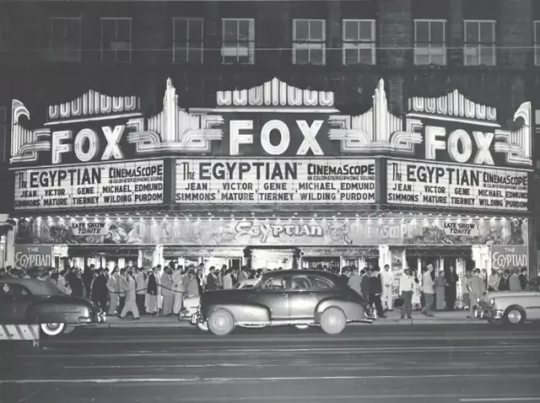


One year later, they moved the Little Caesars world headquarters from the suburbs into the newly renovated Fox Office Center adjacent to the restored theatre. This was during a time when many businesses were fleeing the city.
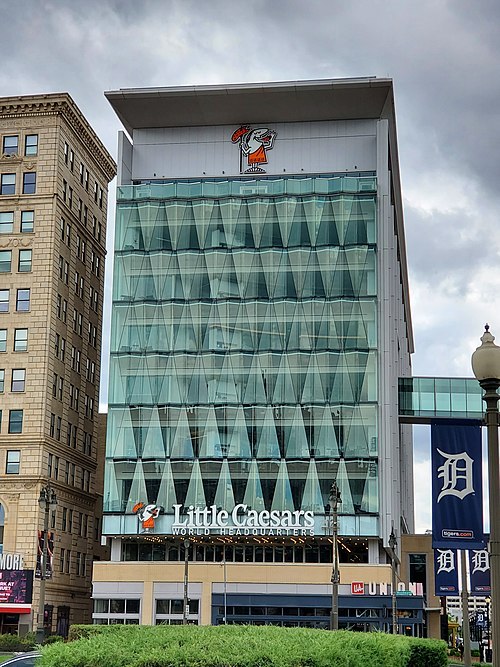
Mike displayed further commitment to the city he loved when he purchased the Detroit Tigers in 1992 and built a new state-of-the-art ballpark for the team. Remembering his early years as a minor league baseball player with the Tigers, he did everything in his power to make the fan experience at Comerica Park a memorable one.

Mike and Marian believed passionately in giving back to the community. As the parents of children who played hockey, the couple wanted to provide other children the opportunity to play the sport as well. So, they established the Little Caesars Amateur Hockey Program in 1968, and it has provided opportunities for tens of thousands of youngsters to play the great game of hockey over the years. Hundreds have gone on to play at colleges, universities and in the National Hockey League.
Inspired by the story of a veteran returning to civilian life, Mike founded the Little Caesars Veterans Program in 2006. The program provides honorably discharged veterans with financial incentives and other support to help them open a Little Caesars franchise.
Since 2000, grants and giving from Marian and Mike, the Ilitch companies and its charitable affiliates have totaled $220 million. This includes Marian and Mike's personal gifts of nearly $50 million to Detroit's Wayne State University - $8 million to the Department of Surgery and $40 million to build a new home for the Mike Ilitch School of Business, prominently located on Woodward Avenue.
#michigan#detroit tigers#detroit red wings#pizza#nhl#mlb#comerica park#little ceasers#little ceasers arena#fox theater#detroit pistons
48 notes
·
View notes
Text
HOW MUCH THE NRA AND THE 'EVIL' GUN LOBBY SPENDS EACH YEAR.
The popular narrative from prohibitionists is that the lack of legislative support for various gun control schemes is due to aggressive lobbying. The story goes that “blood money” from the National Rifle Association and other gun lobby efforts along with the firearm industry has a stranglehold on elected officials who are just pining to do “the right thing” but are being drowned out by all the cash.
How much money is actually spent by the NRA on lobbying? How does this compare to lobbying efforts from elsewhere?
Statista is a German online platform specializing in data gathering and visualization in German, English, Spanish, and French. The company provides statistics and survey results presented in charts and tables. Its main target groups are business customers, lecturers, and researchers, offering subscriptions to a database of companies in the same manner as Bloomberg L.P.
Statista’s data partners include the Federal Statistical Office, the Allensbach Institute for Public Opinion Research, the OECD, and the German Institute for Economic Research. Other partners include the Financial Times and Fortune. Financial Times Germany named them among the winners of the start-up competition, Enable to Start.
Major U.S. Political Lobbying
The big three in major U.S. political lobbying are Pharmaceuticals/Health Products ($357 million per year), Electronics Manufacturing ($180 million per year), and Insurance ($153 million per year.)

Major annual lobbying expenditures in the United States
www.statista.com/statistics/257364/top-lobbying-industries-in-the-us
Critical note: Statista felt compelled to add the following footnote to this chart:
The NRA and lobbying: One of the most famous lobbying organizations in the United States is the National Rifle Association (NRA), which lobbies lawmakers in favor of gun rights. However, despite this, it only spent around 2.2 million U.S. dollars on lobbying expenditures in 2020.
Apparently, they received so many inquiries as to why the NRA wasn’t included in that chart above they included the answer right underneath: the NRA spends a marginal fraction on lobbying compared to the actual big spenders.

NRA (bottom) compared to the actual big lobby efforts.
Gun Lobby Money:
The NRA typically spends a few million dollars per year on lobbying. From 1998-2022, the most the NRA spent on lobbying in a single year was just over $5 million. Most years it’s between 1.5-2.5 million.

www.statista.com/statistics/249398/lobbying-expenditures-of-the-national-rifle-associaction-in-the-united-states/
The National Shooting Sports Foundation also lobbies. In 2023, according to federal records, the NSSF spent the most in lobbying in its 60-year history: $5.4 million on federal lobbying, slightly more than the NRA’s all-time annual record amount.
Anti-Gun Lobbying:
Firearm prohibitionists claim there is some large grassroots movement to push for legislative restrictions. It turns out that many anti-gun organizations are astroturfing fronts funded as tax deductions by a small group of very wealthy donors. These “organizations” provide no services with all funding received as contributions.
As an example, “March for Our Lives” bills itself as a grassroots movement of young people working to restrict gun ownership under the guise of safety. In reality, this is a front group funded by a few dozen donors. According to public tax documents for March for Our Lives, the group is funded almost entirely by large tax-deductible donations in excess of $100,000 with less than 1% of all donations from people donating less than $5,000. Nearly 100% of “March for Our Lives” income is Contributions serving as a tax deduction for donors and no Program Services are offered. Contrast this to the NRA’s public tax records where nearly half of the income is from Program Services and about a third is from Contributions.
Lobby Money Breakdown
Pharmaceutical companies spend the most on lobbying, much more than any other industry or sector. Pharmaceutical companies spend more on lobbying than second and third place (Electronics Manufacturing and Insurance) combined. Novo Nordisk, the maker of the obesity drug Ozempic, has spent $10 million per year just to lobby for that one drug with their primary effort pushing for the passage of the proposed Treat and Reduce Obesity Act which would emphasize regular prescription by doctors to patients for Ozempic. That doesn't count the $100 million Novo Nordisk has spent in advertising this drug to the general public.
Dr. Fatima Cody Stanford, appointed to the current Dietary Guidelines Advisory Committee, has declared that “obesity cannot be treated with exercise and good diet” and is pushing for more pharmaceutical interventions. This push is for drug interventions such as Ozempic. Prior to this appointment, Dr. Stanford had been a paid consultant for Novo Nordisk.
#the great awakening#government corruption#fjb#wef#bill gates#illegal immigration#joe biden#democrats#donald trump#world economic forum#nra#lobbyists should be banned#big pharma lobby#nra lobby
31 notes
·
View notes